Published by Sri_Krishna_Saras
The author is a senior citizen, an Engineer, post-graduated in Sanskrit after retirement. The main idea behind this blog, is to compile and digitise the various subjects, particularly the Sanskrit literature & hymns. For easy reading of Sanskrit lyrics, the Fonts are well spaced, words separated from one another. Hence the meaning of the Sanskrit texts can easily be grasped. As the entire write-up is digitised, it can be referred at any time, through mobile, tablet and laptop computers.
The author is thankful and grateful to all Eminent people, Scholars and others, who have provided various valuable information in books, articles, write-up and also images etc. both on-line & print medium. These informations enabled the author to compile, add, edit and modify and present in different format. The author hopes that this exercise and efforts will enable the readers, to comprehend the the subject matter, in proper perspective. The publications are only for self satisfaction and with no commercial intent. Blessings and love to all readers.
View all posts by Sri_Krishna_Saras


















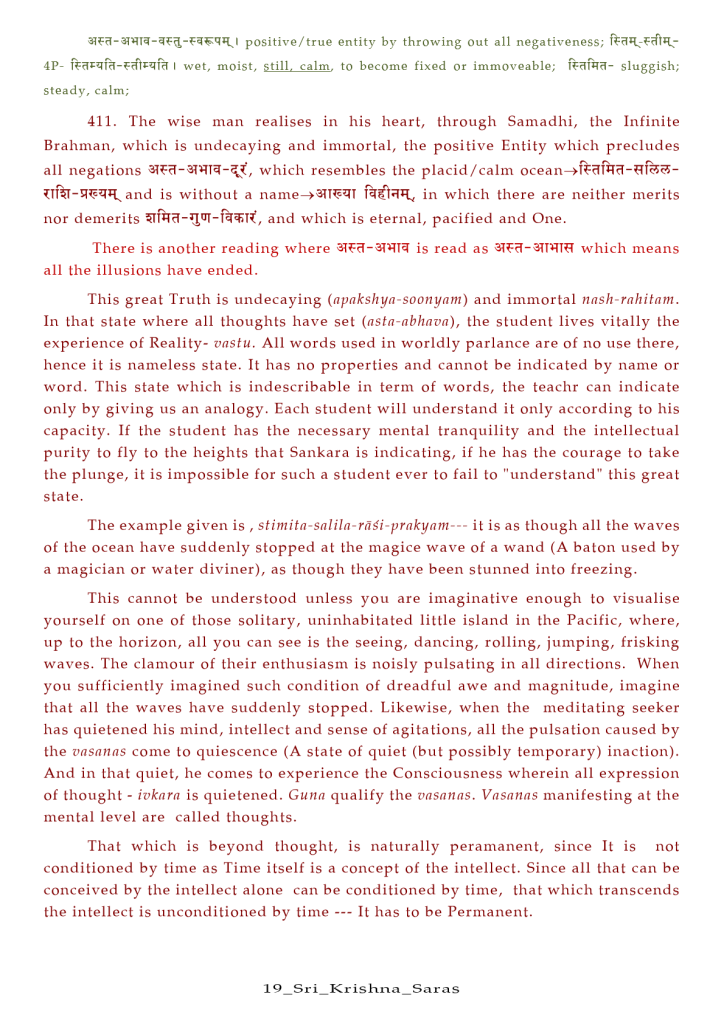
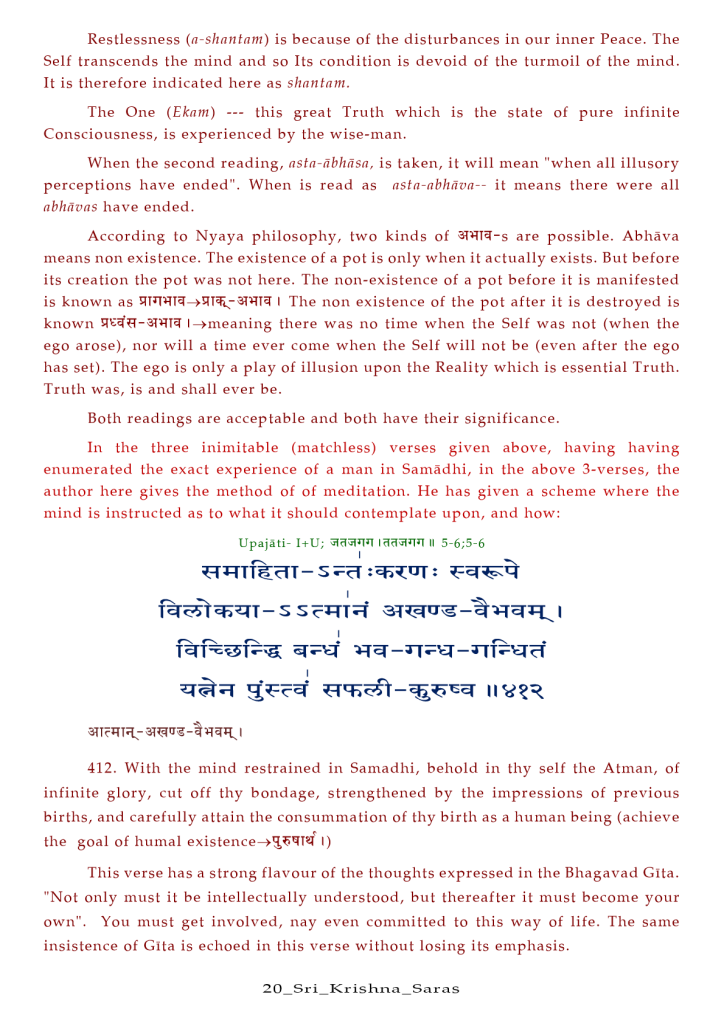
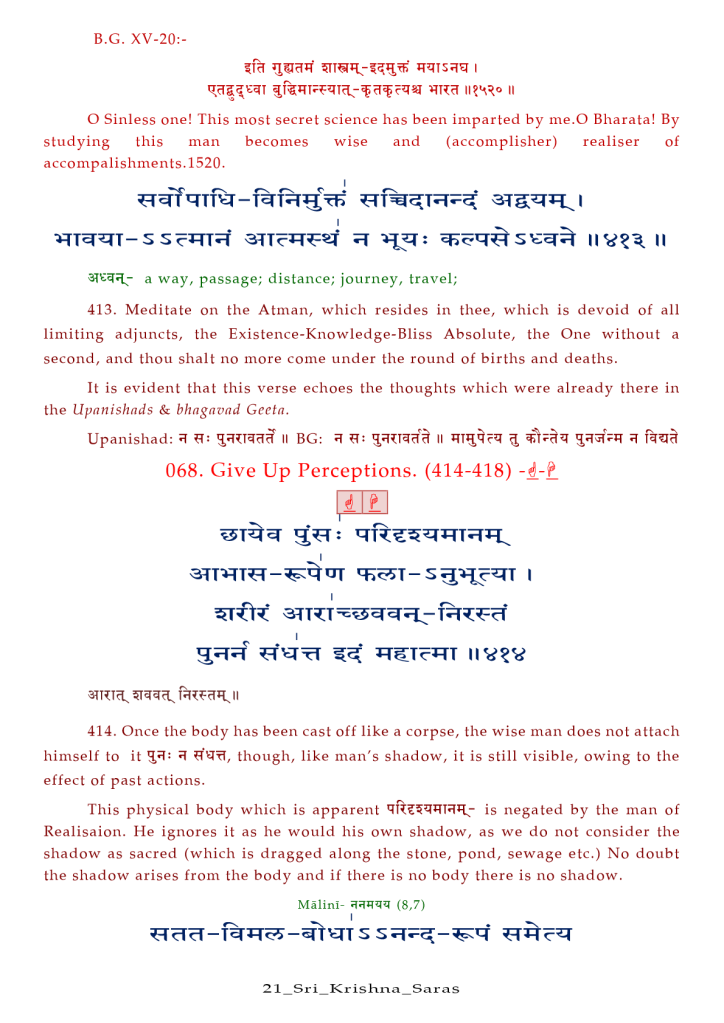
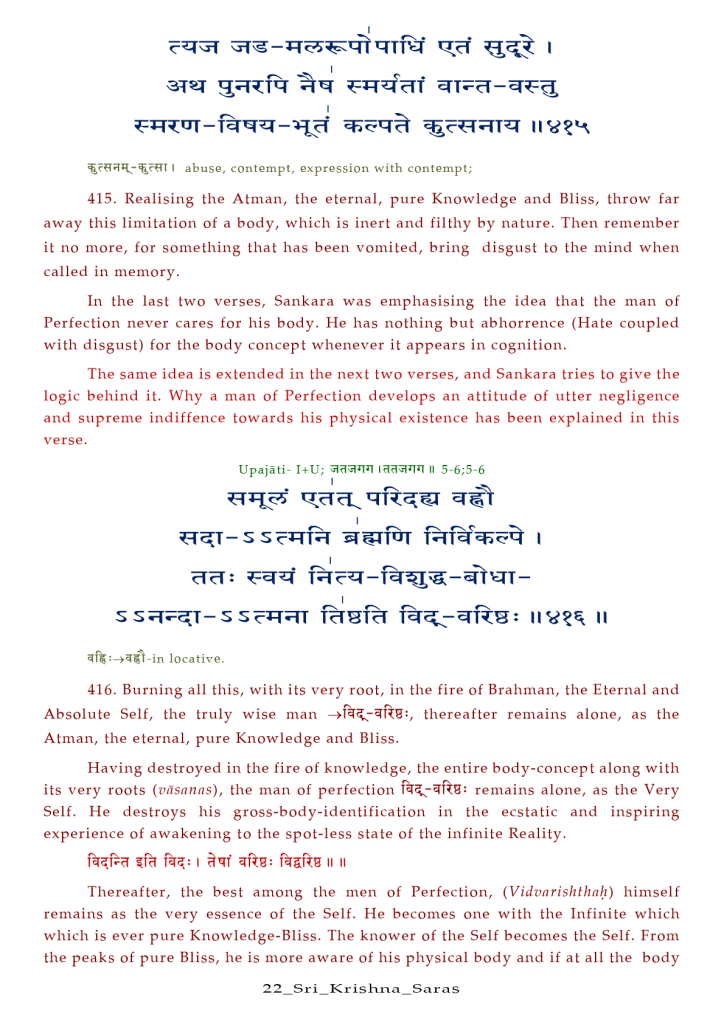
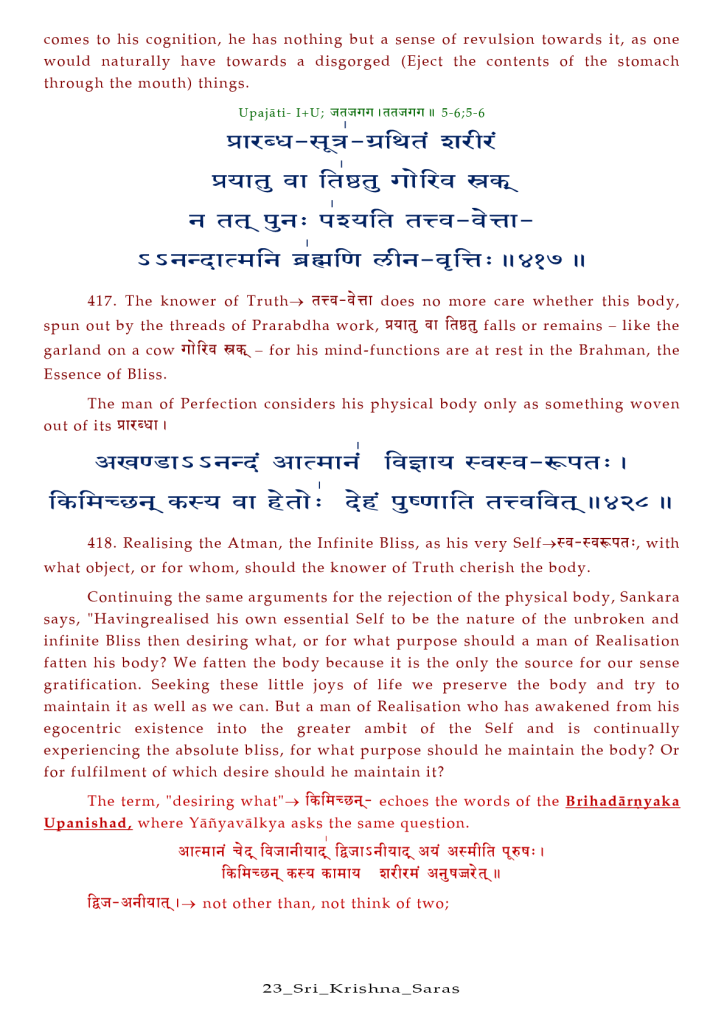
!["When one has realised one's Self to be nothing other than this great Purusha,
this infinite then desiring what, (or for the fulfilment Of which desire),
should he thereafter nurse, nourish and fatten his physical body?"
069. The Science of Reality-- Its Benefits. (419-425) -
CEIL]
11
419. The Yogi who has attained perfection and is liberated-in-life gets this as
a result — he enjoys eternal Bliss in his mind, internally as well as externally.
One who is fufilled in life, one who has cut asunder the shackles Of his finite
existence as the ego, one who is not bound by the chains Of his physical passions, or
mental pangs or intellectual agitations, what will he gain by such an experience?
Sankara insists that such an individual then, constantly experiences the bliss
which is the nature Of the Self, within and without. All exertions in life are only to
discover happiness. Once the highest happiness is gained, other lesser objects Of
happiness are Of no concern.
Thus through meditation, when an individual rises above the realm Of
disturbances and agitations and enters the realm Of sweet Bliss, which manifests
because Of its essential nature; he cannot then precipi tate into any activity we
ordinarily engage in our day to day existence.
11
420. The fruit of dispassion is Knowledge, that of Knowledge is
withdrawal from sense pleasure. The fruits of this withdrawal is the experience of
the Blissful Self and peace is this result of this experience.
The results that will accrue to the personality as an individual starts his
sadhnna are enumerated in a logical sequence.
relating to something preceeding;
421. If there is an absence of the succeeding stages, the preceding ones are
futile. (When the series is perfect) the cessation of the objective world,
extreme satisfaction, and matchless bliss follow as a matter Of course on its own.
24 _ S r i_Kr is a _ Sar a s](https://srikrishnasaras.home.blog/wp-content/uploads/2020/12/image-422.png?w=724)
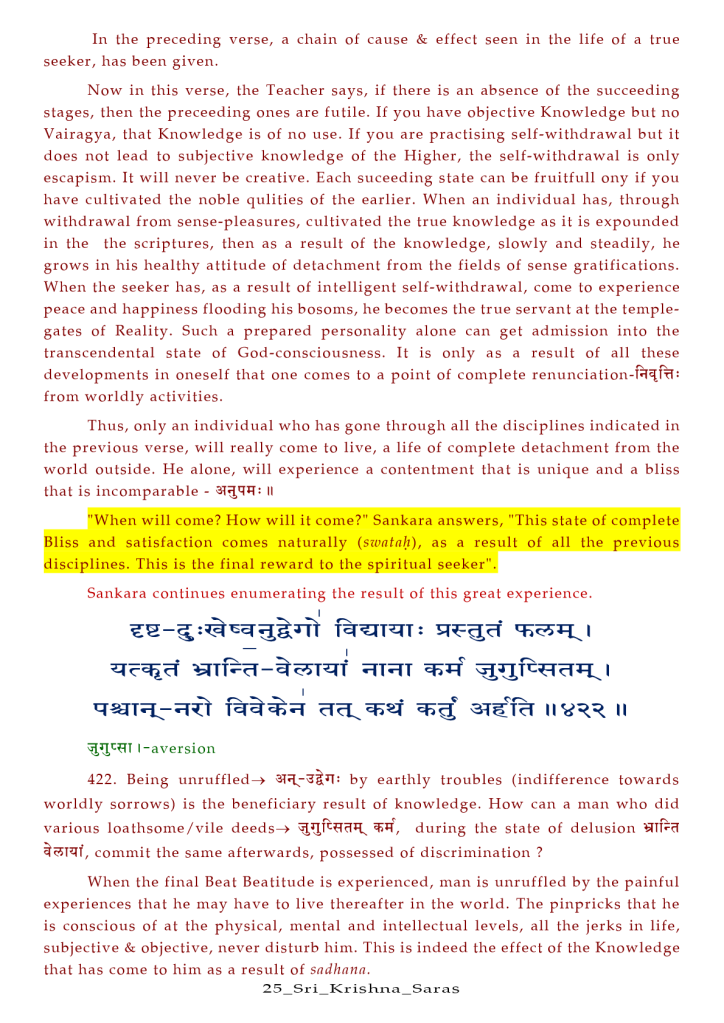
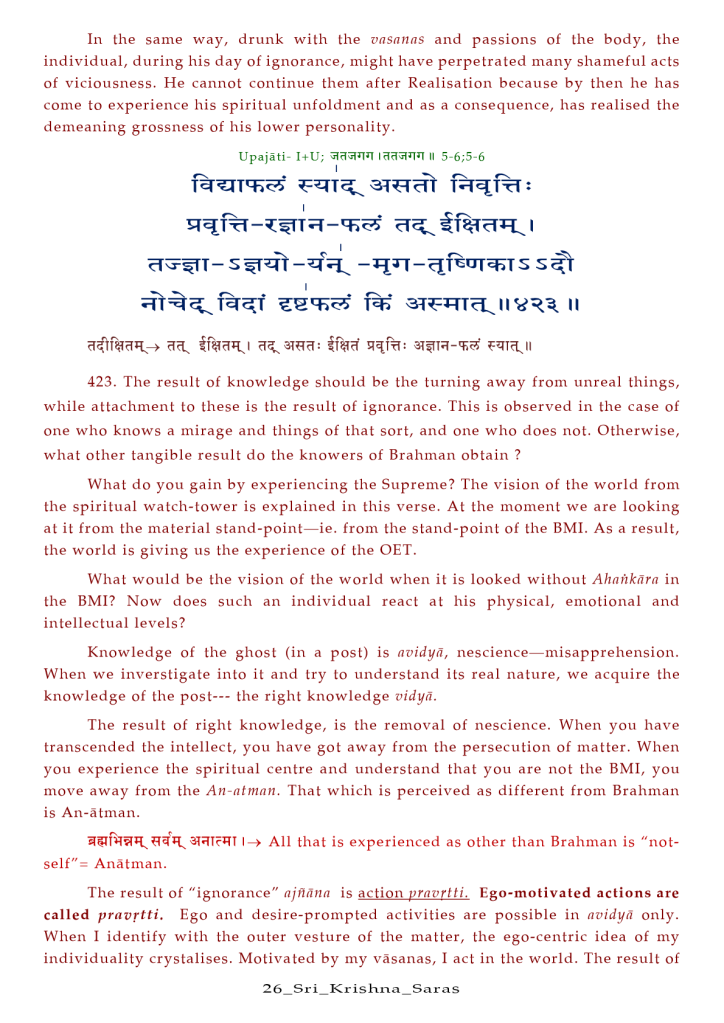
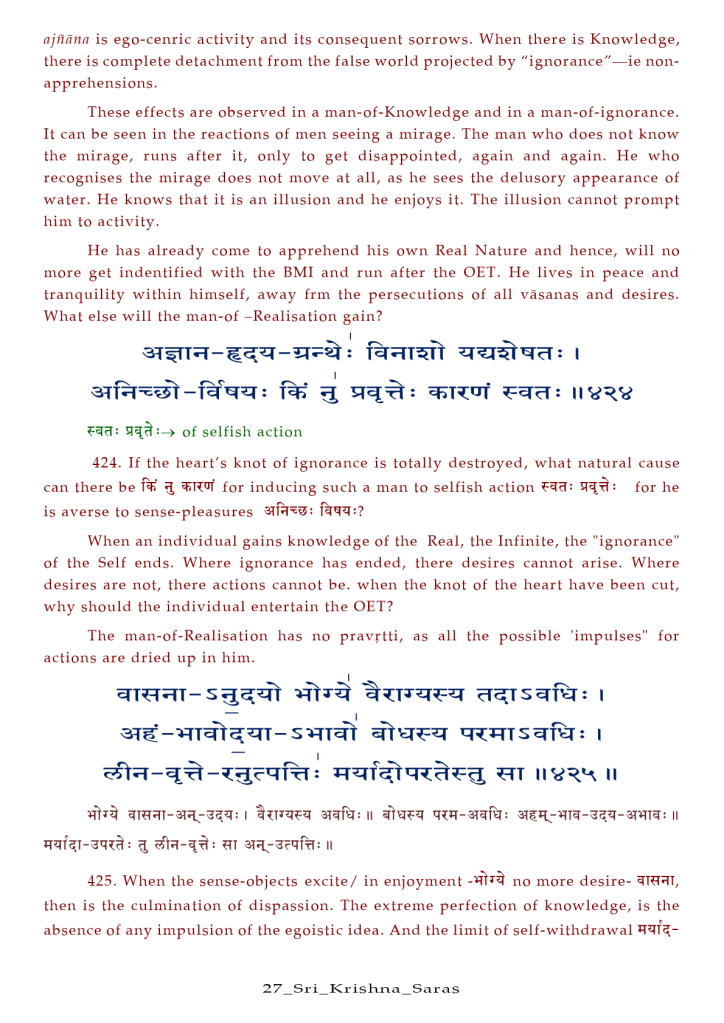
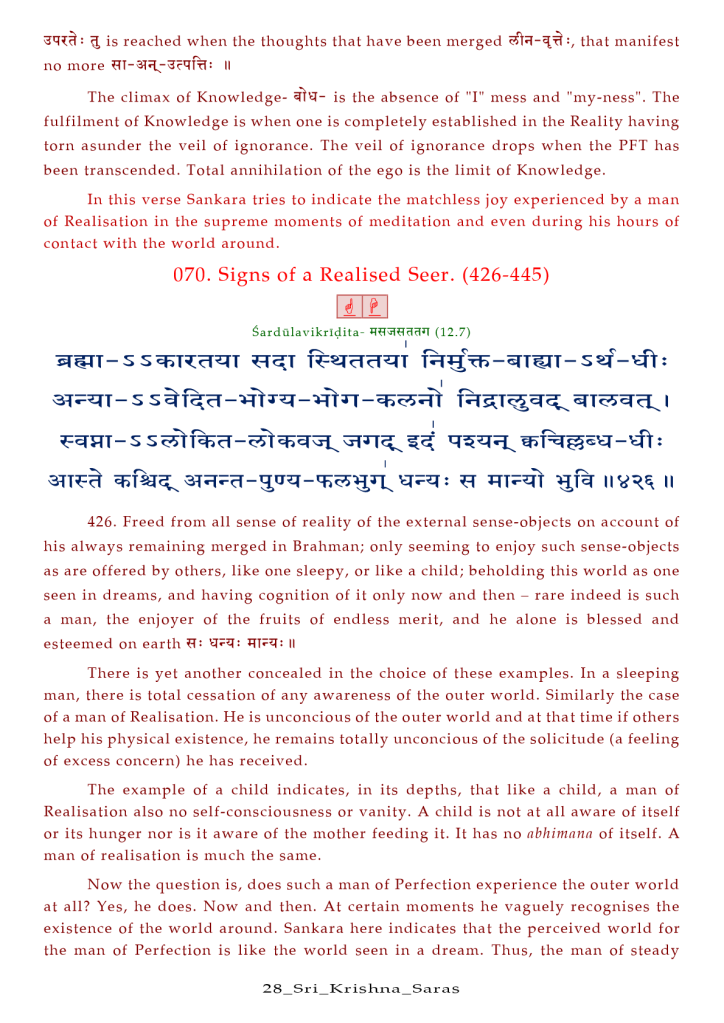
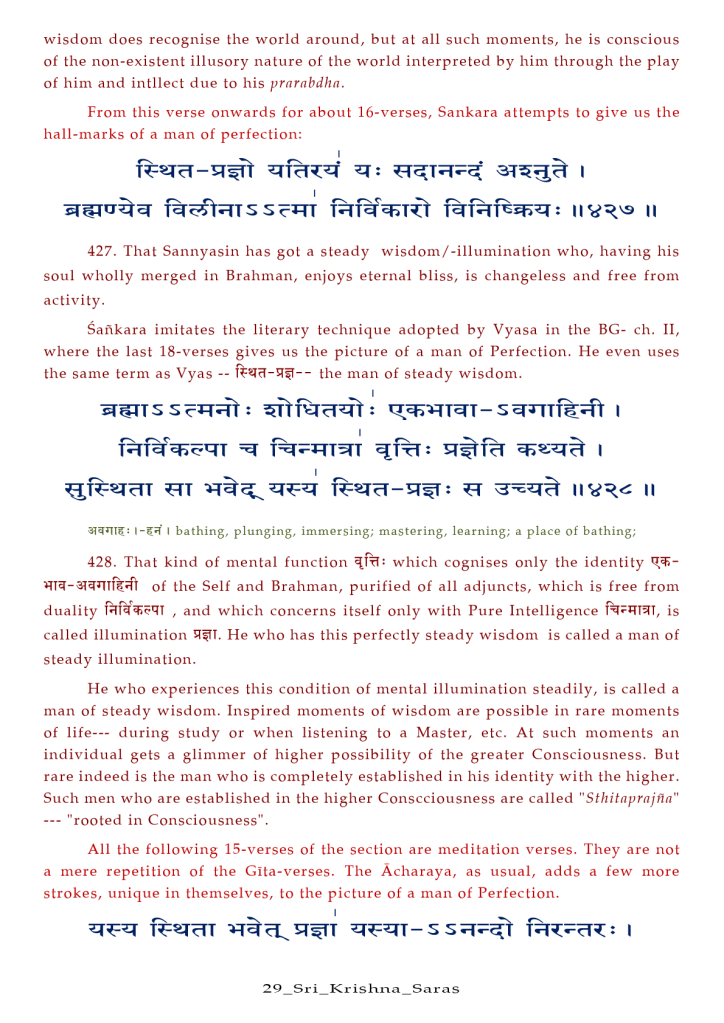
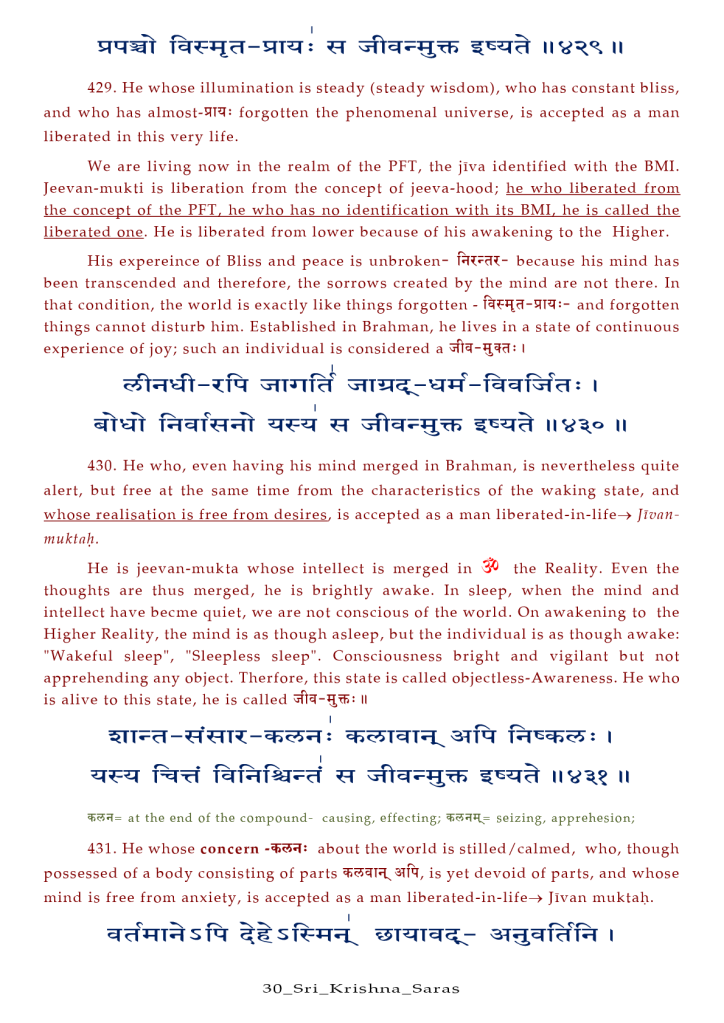
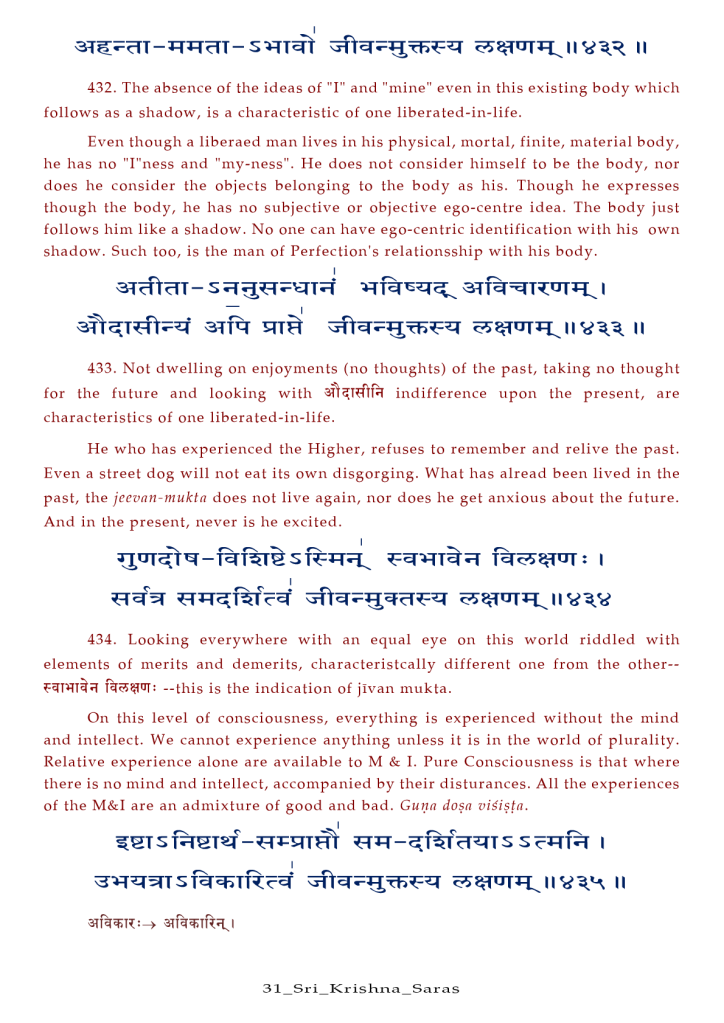
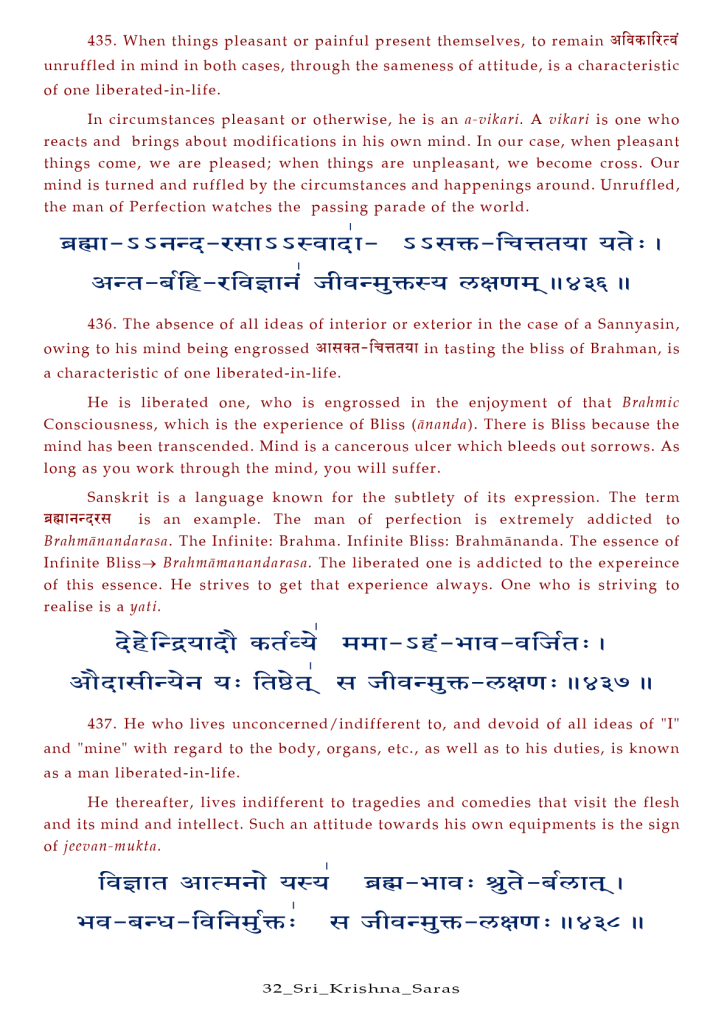
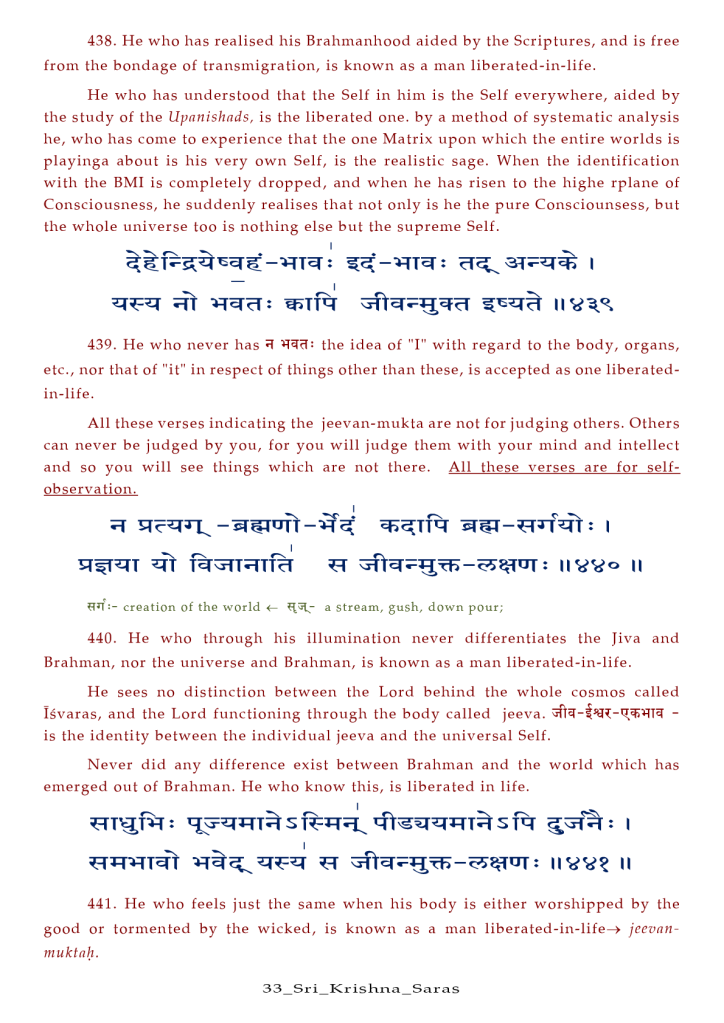

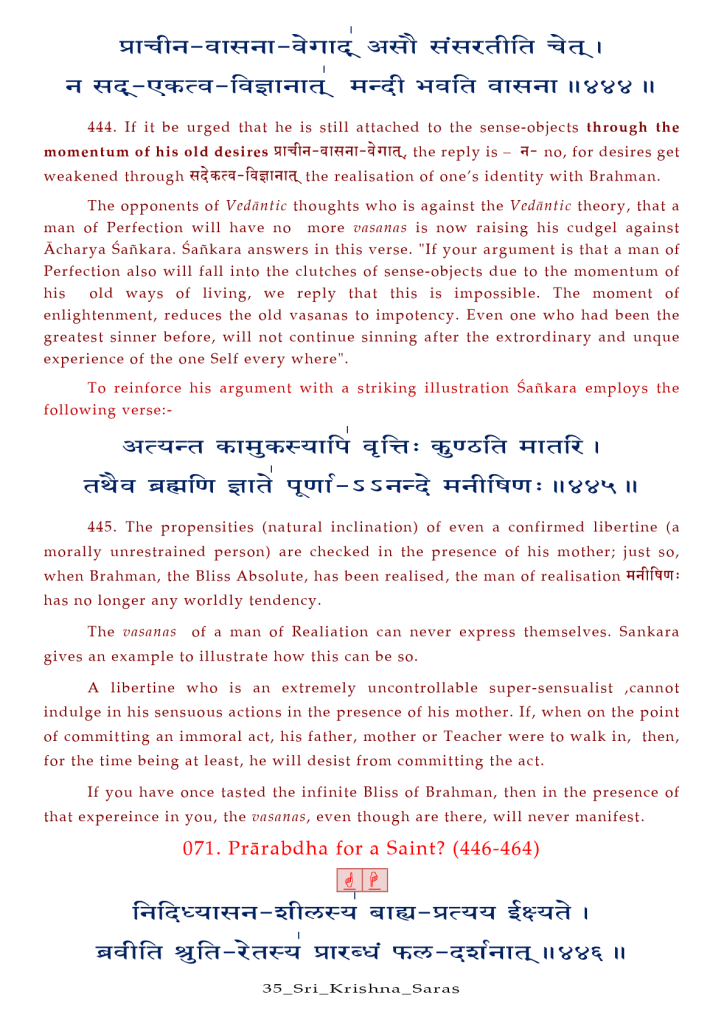
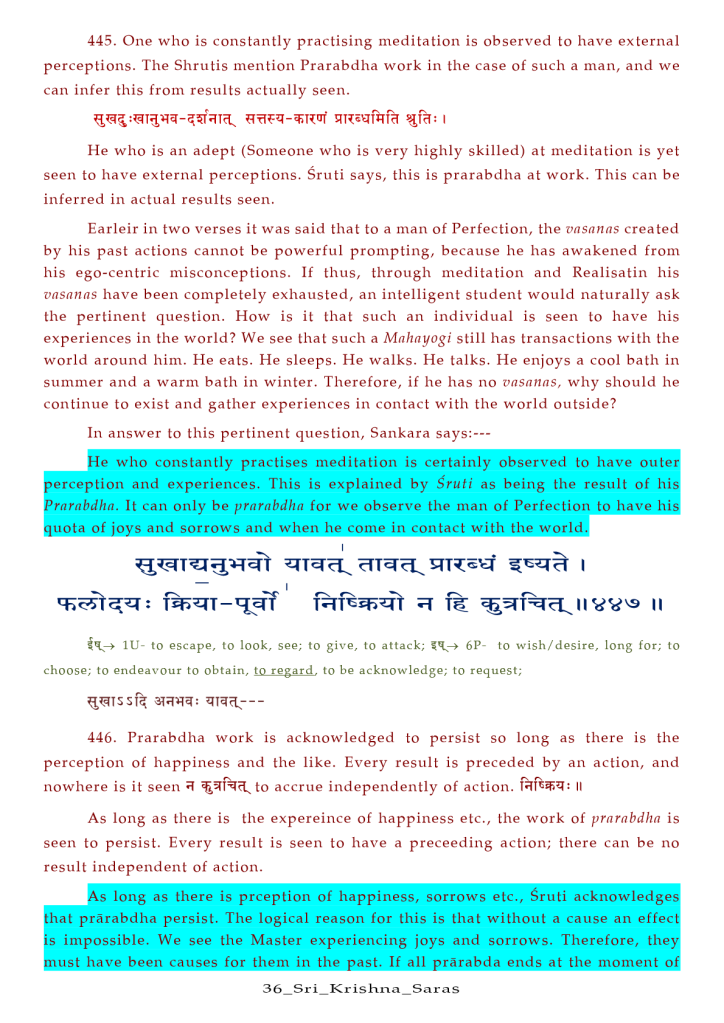
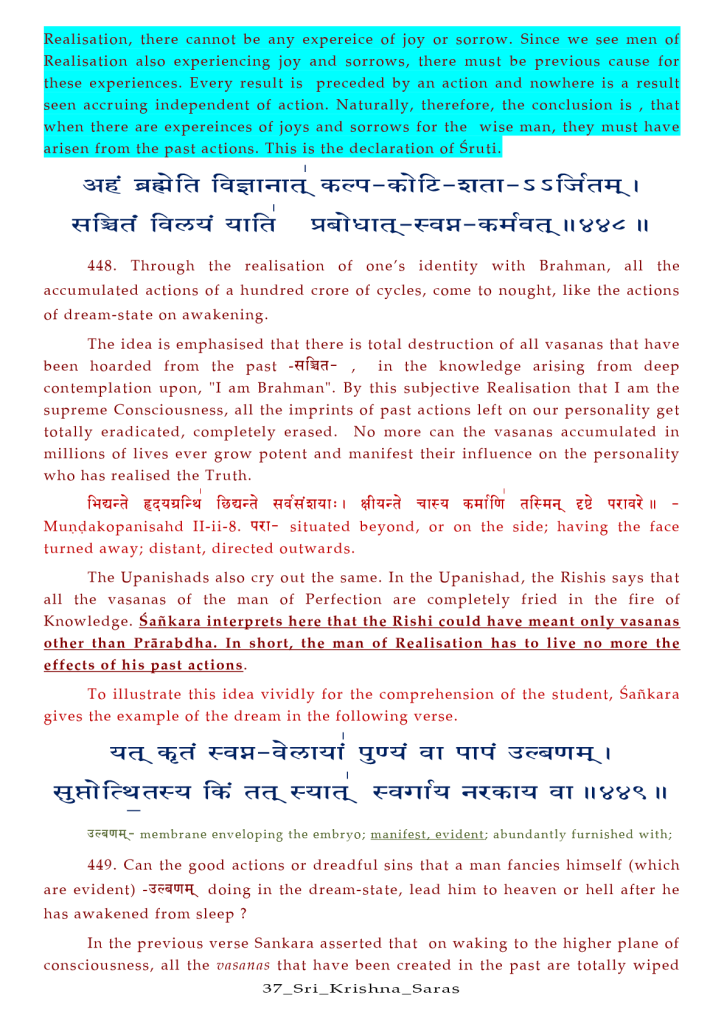
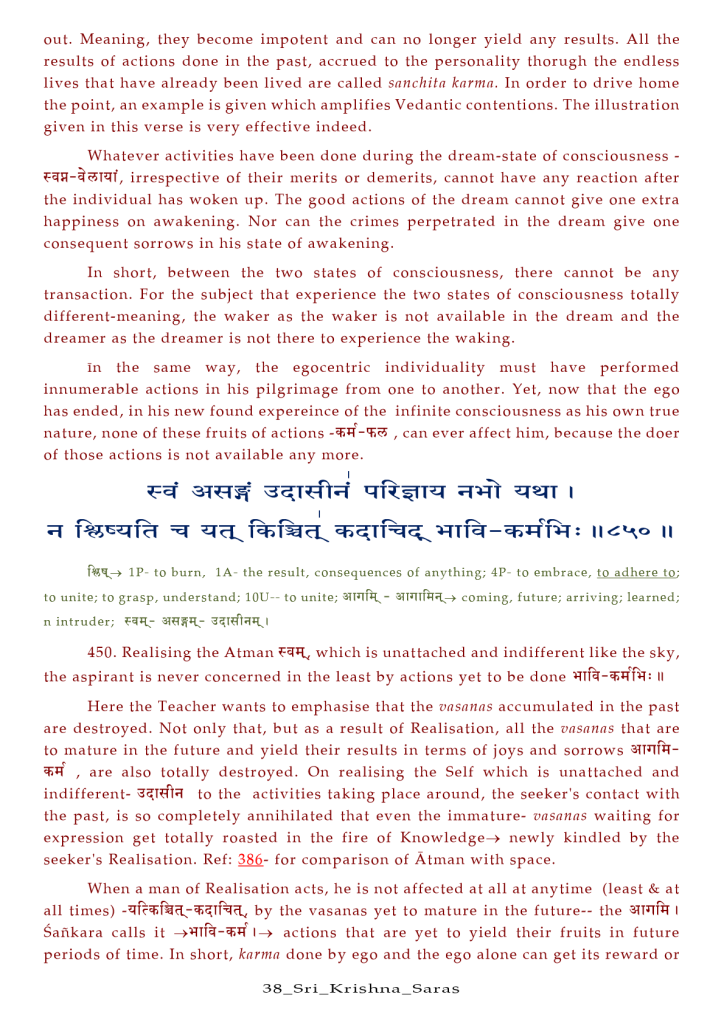
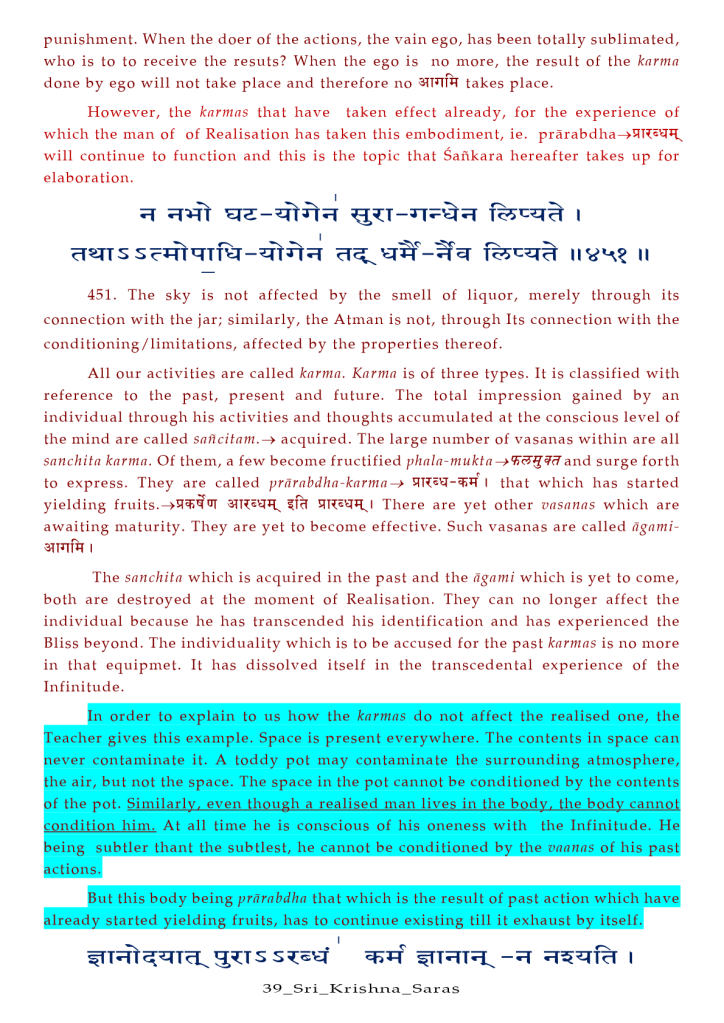
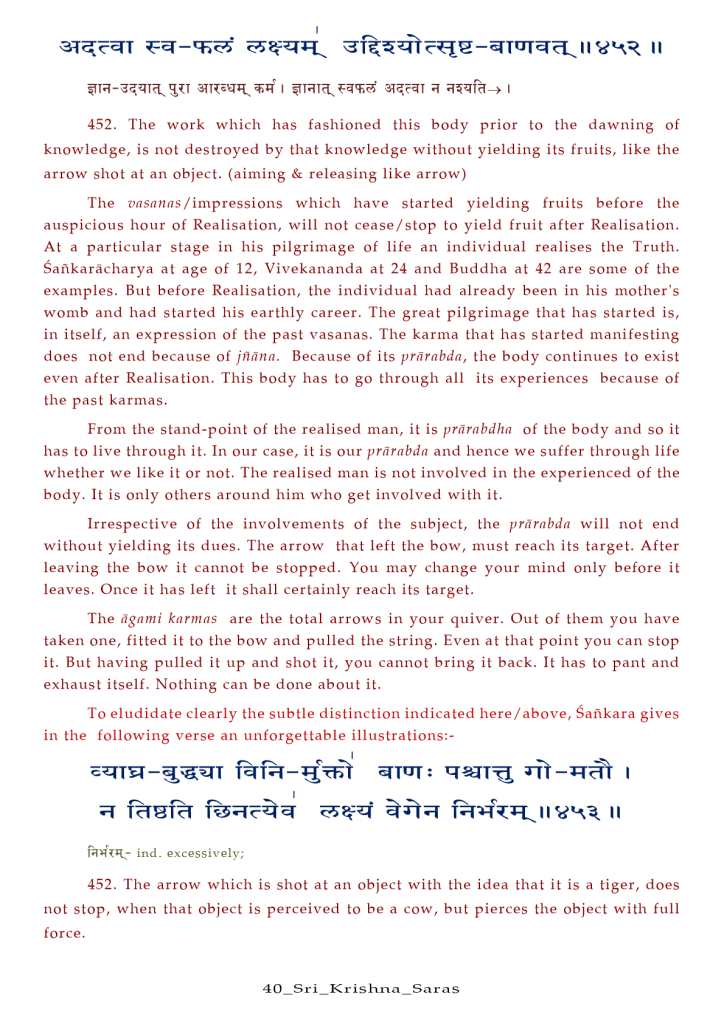
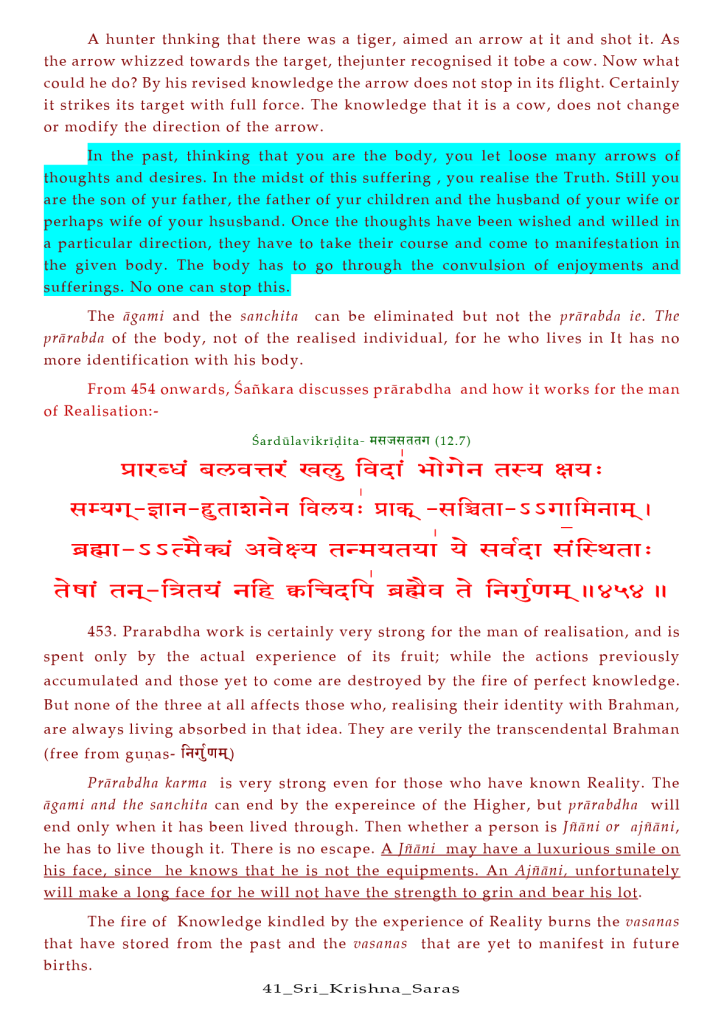
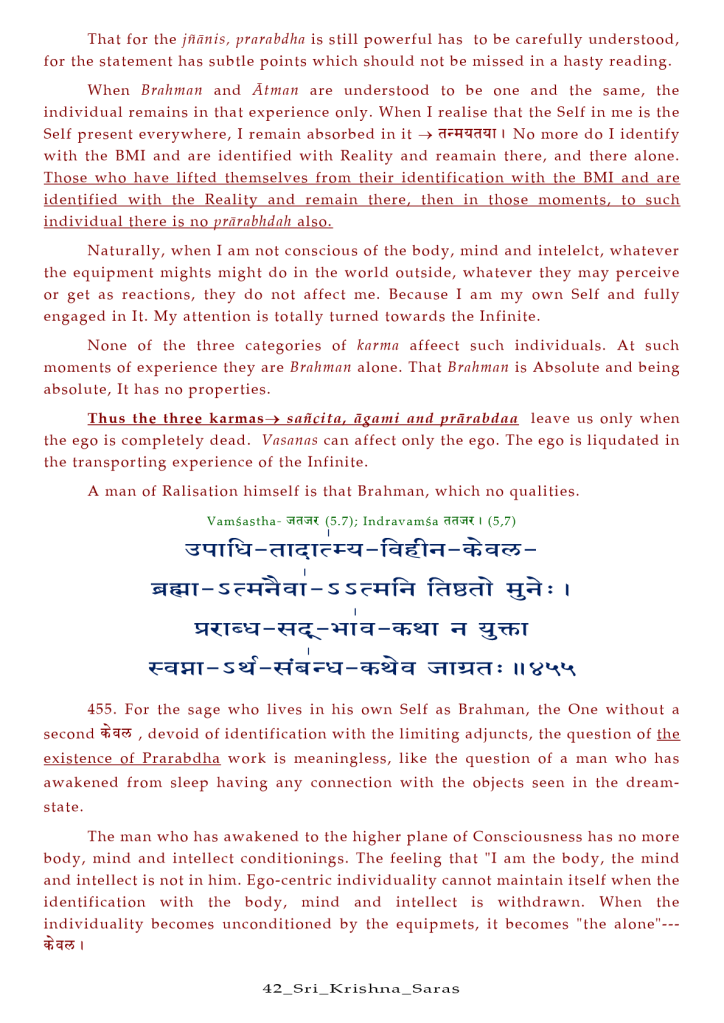
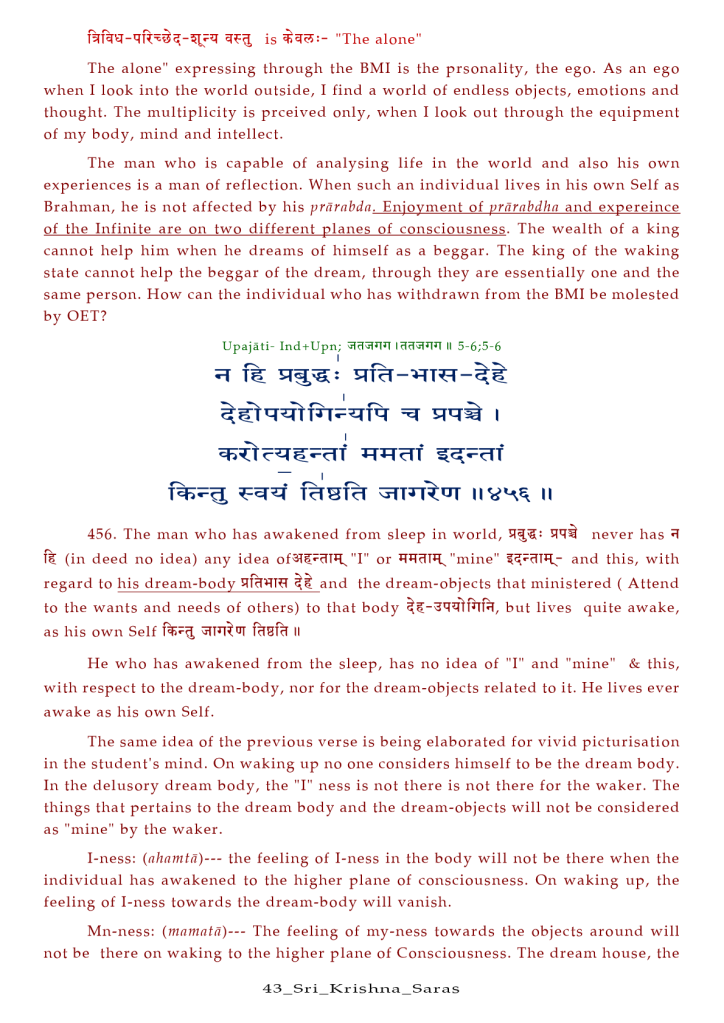
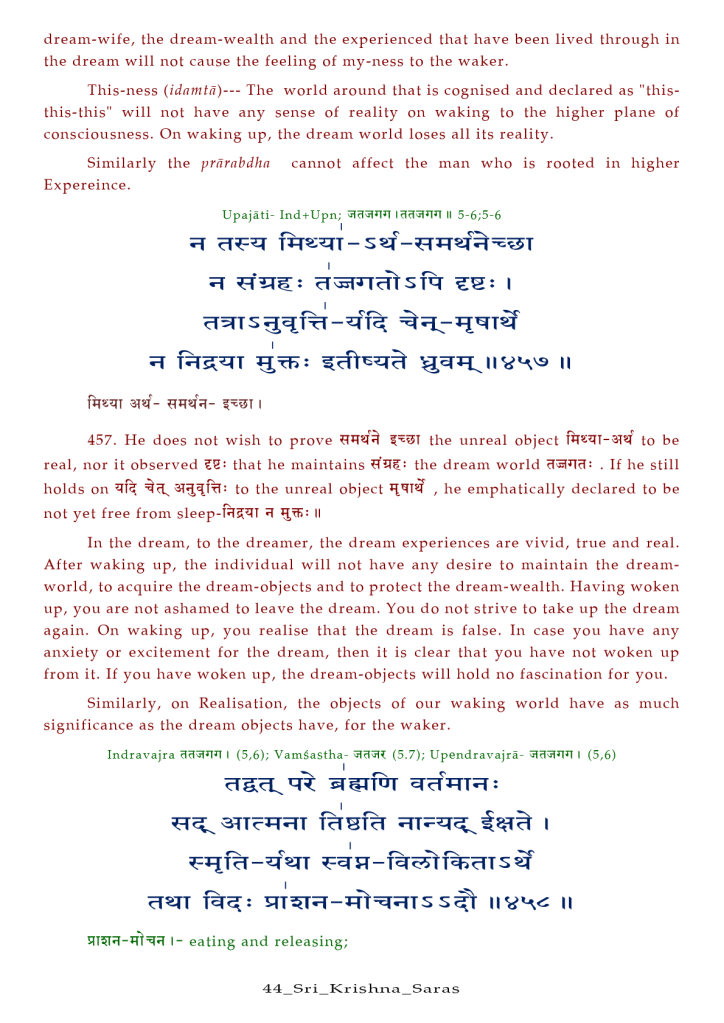
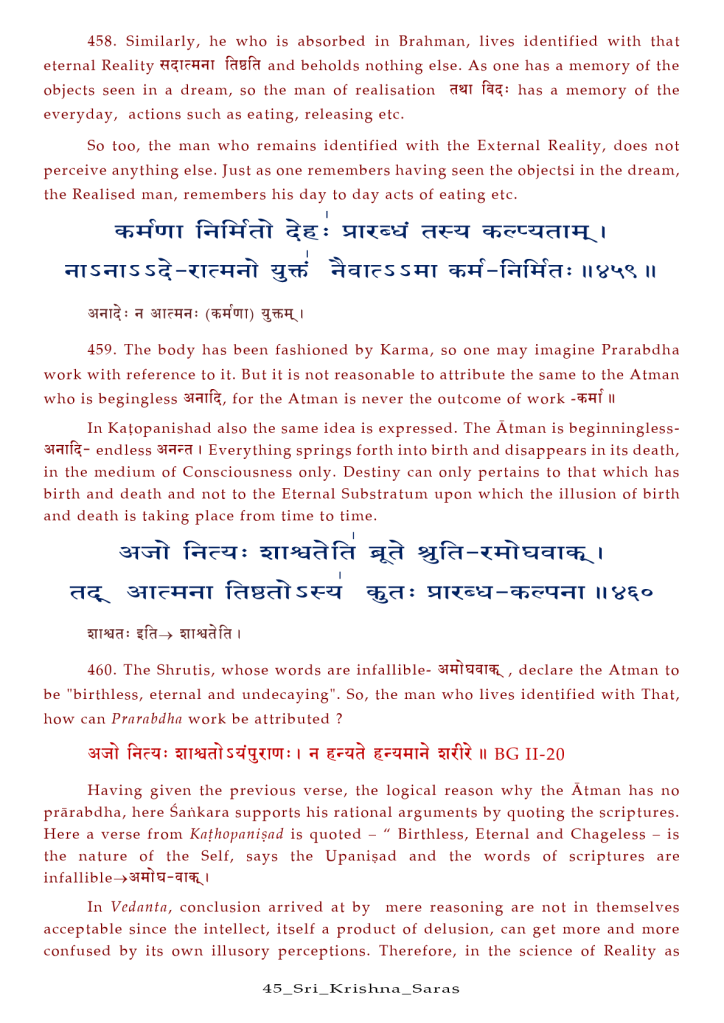
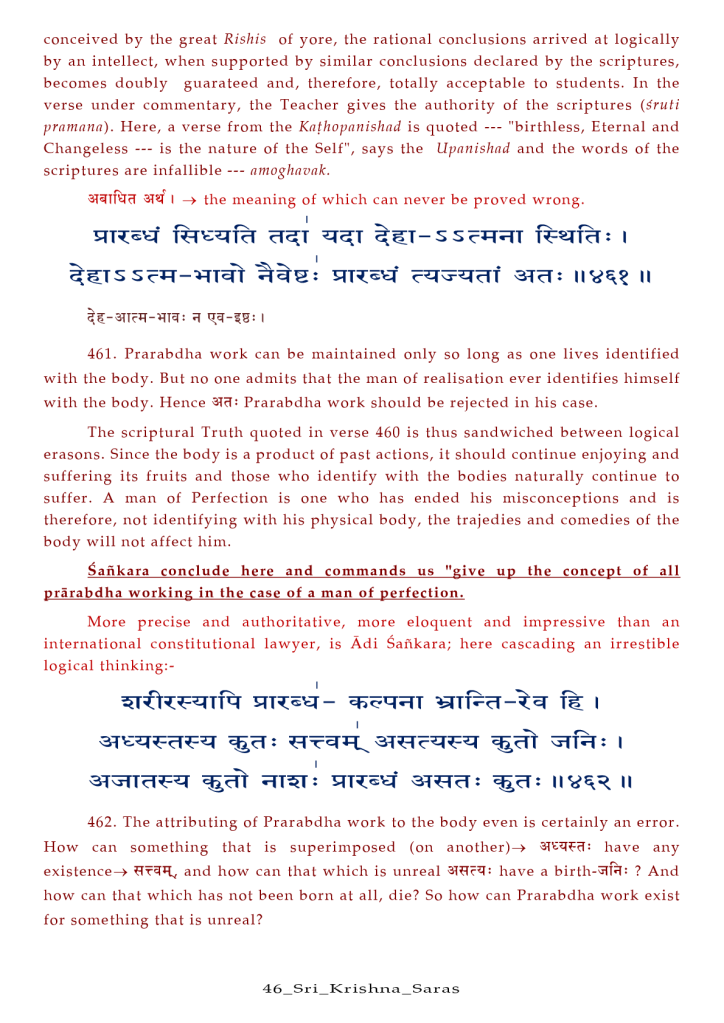
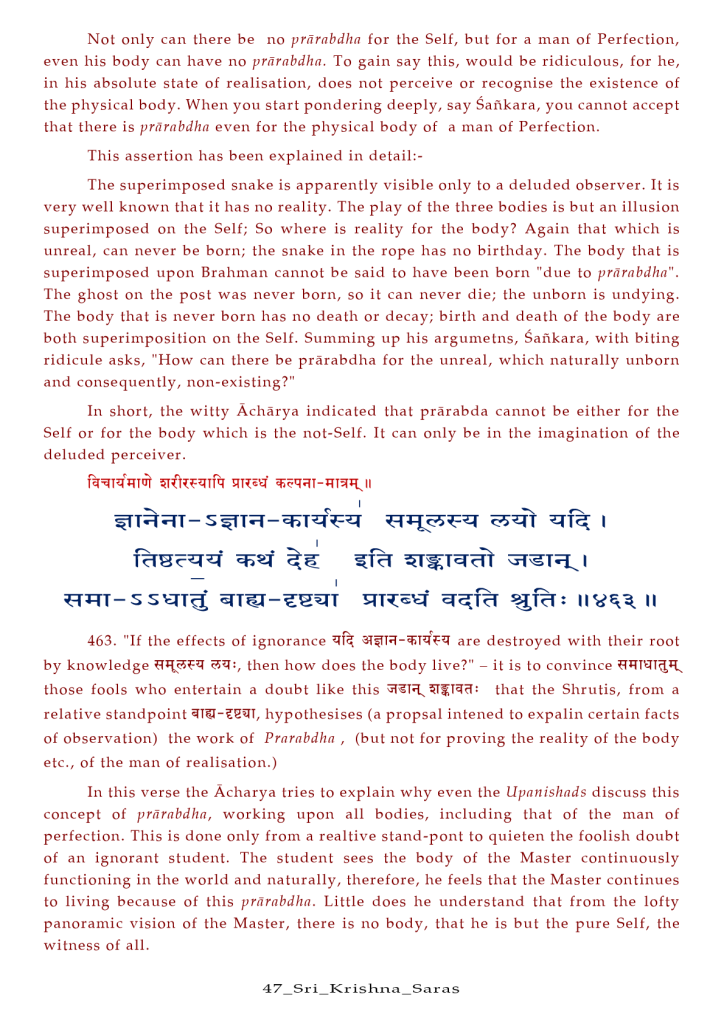
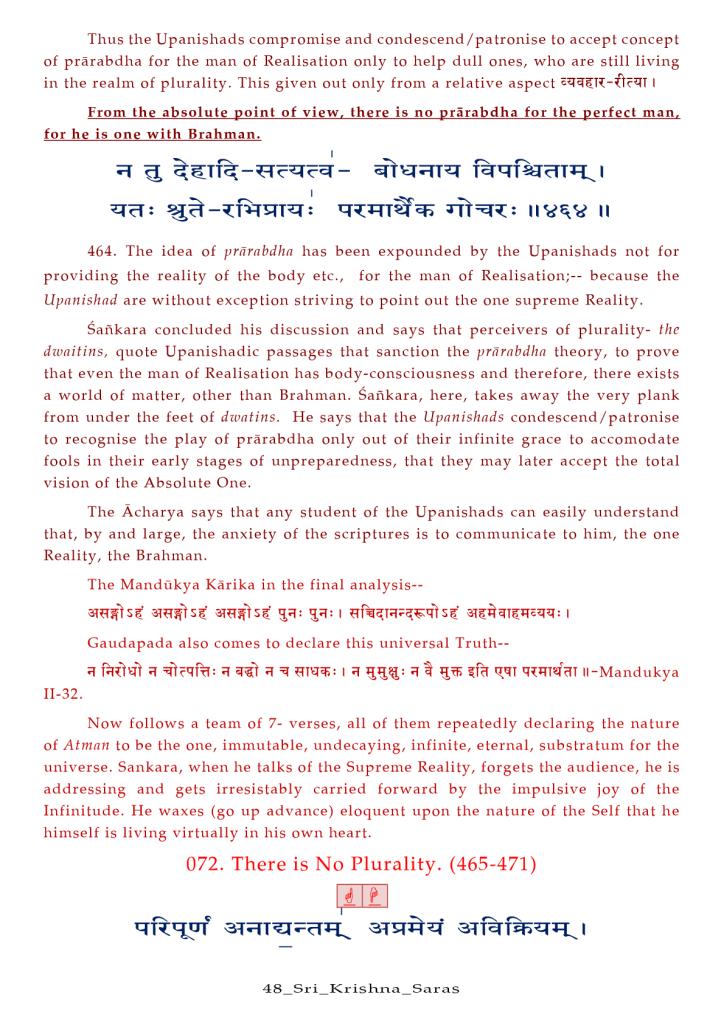
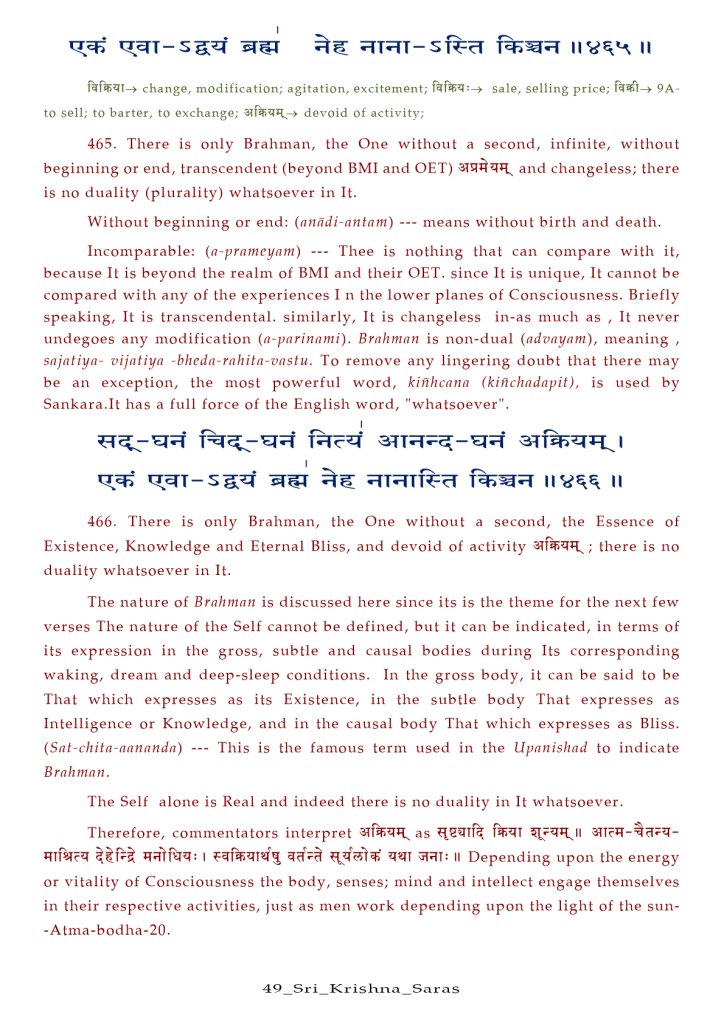
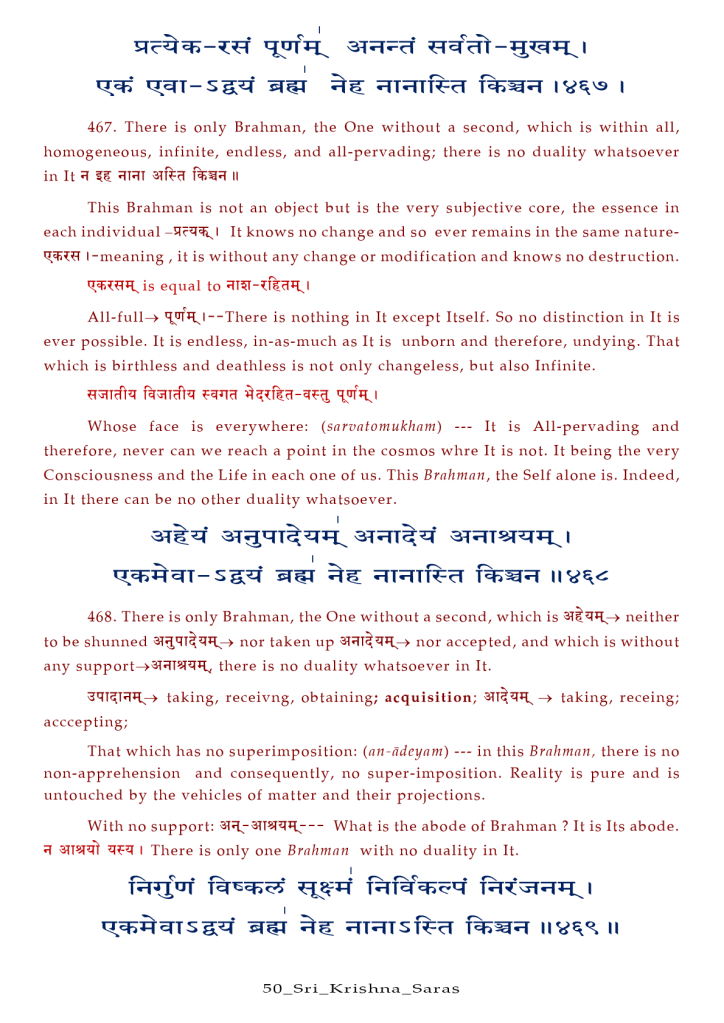
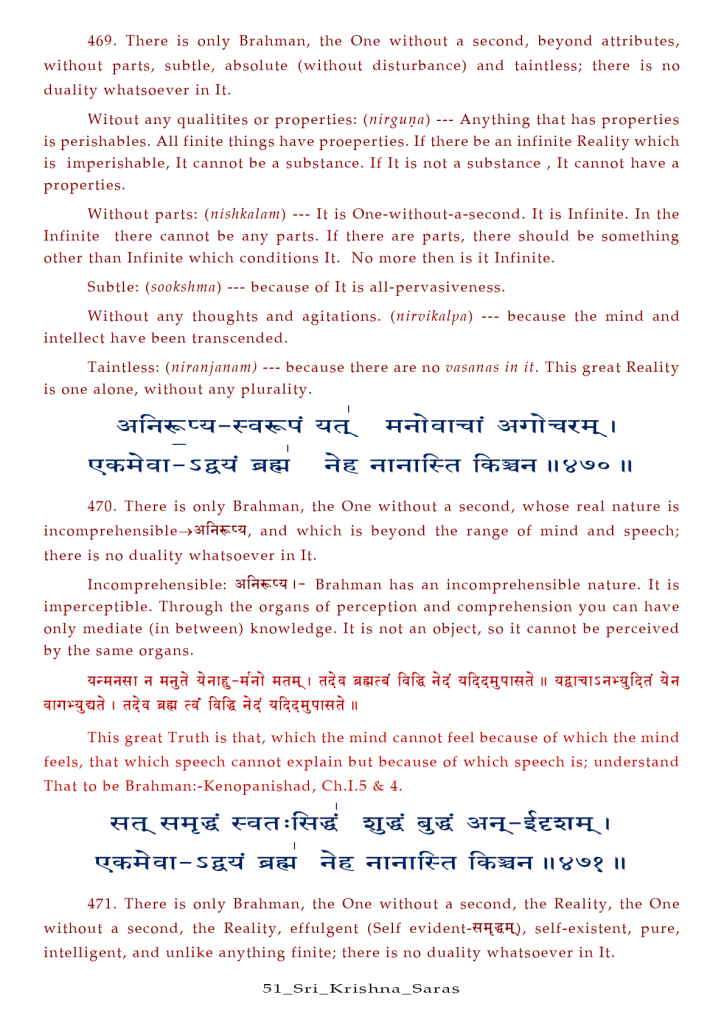
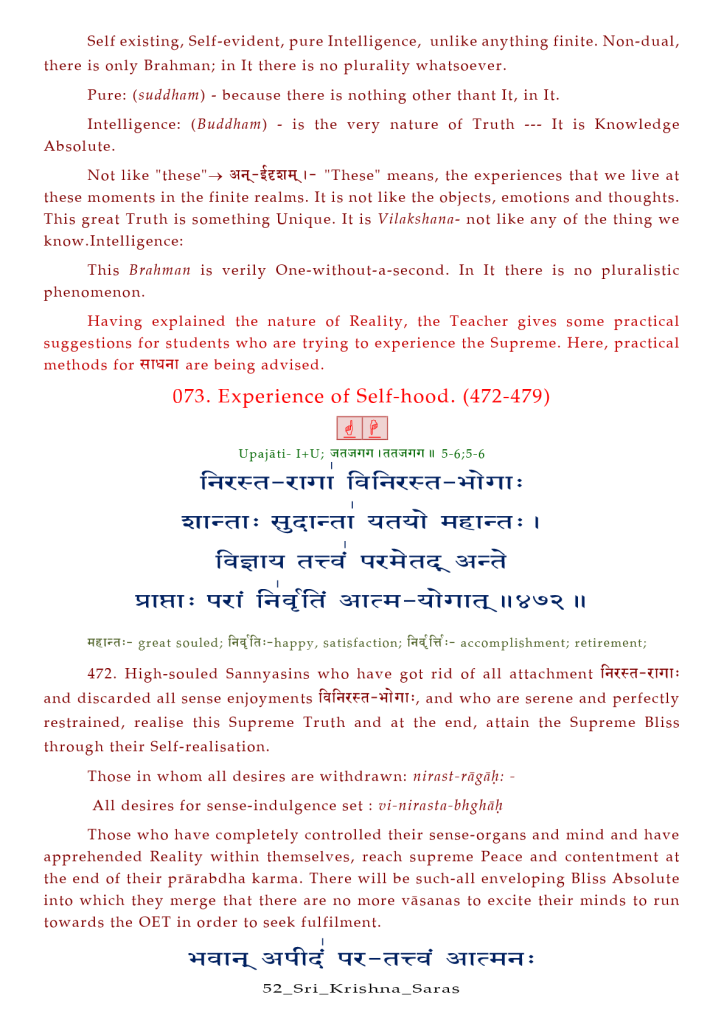
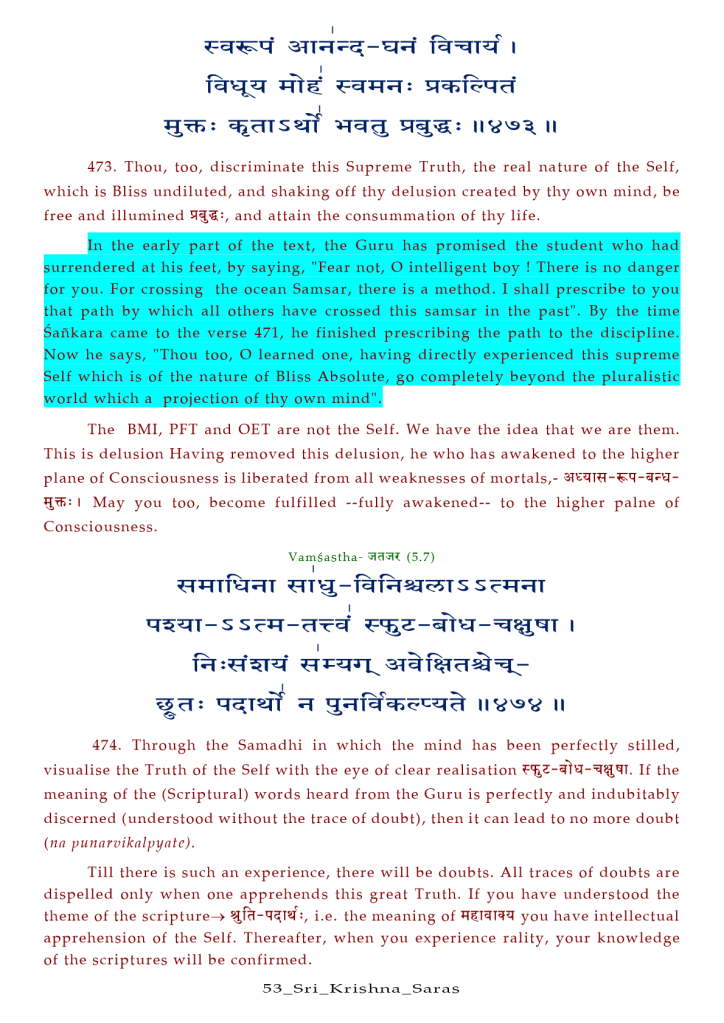
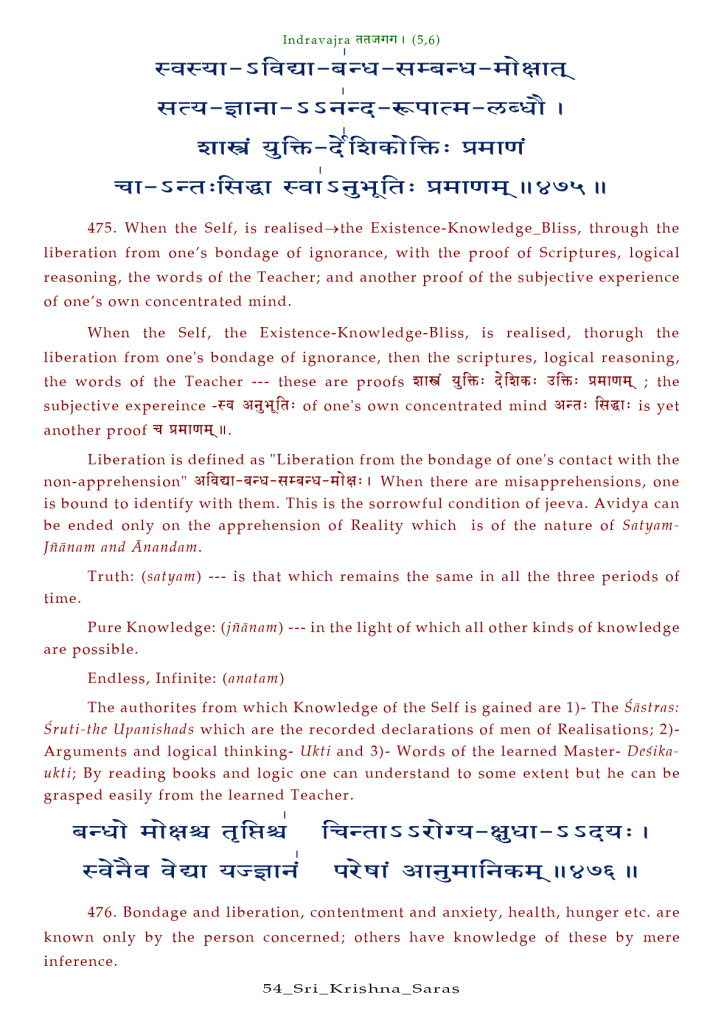
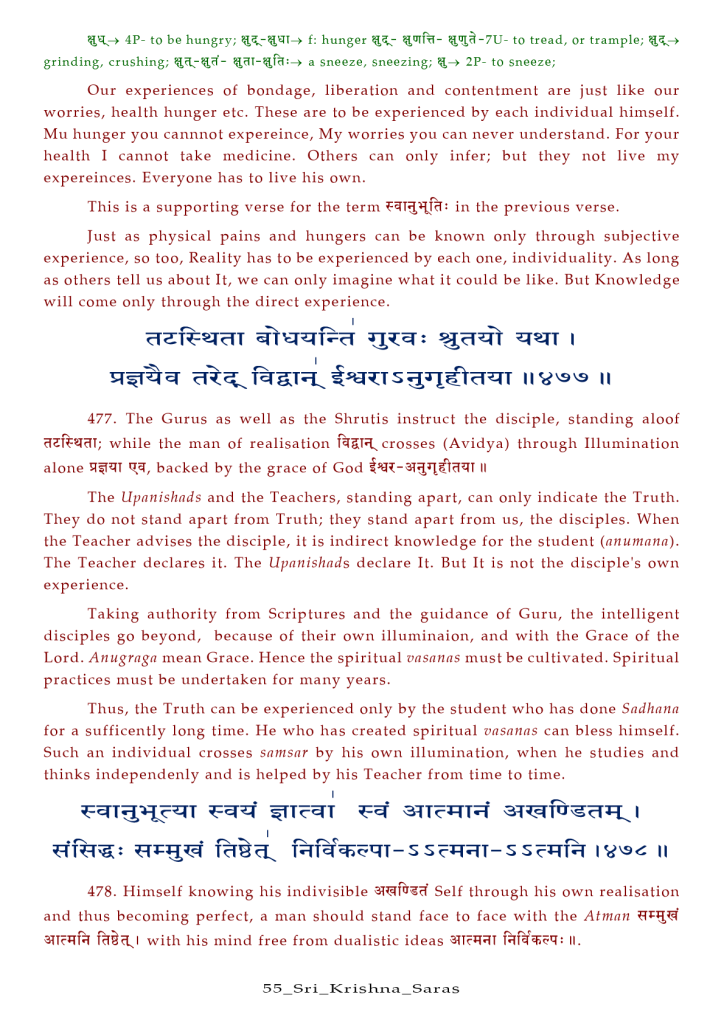
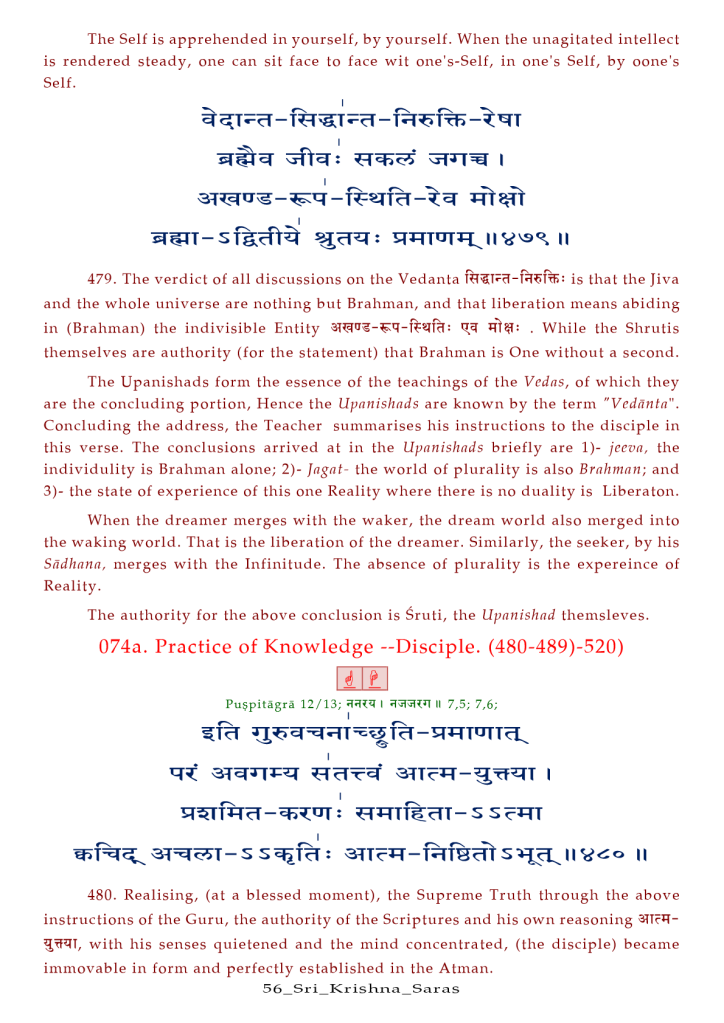
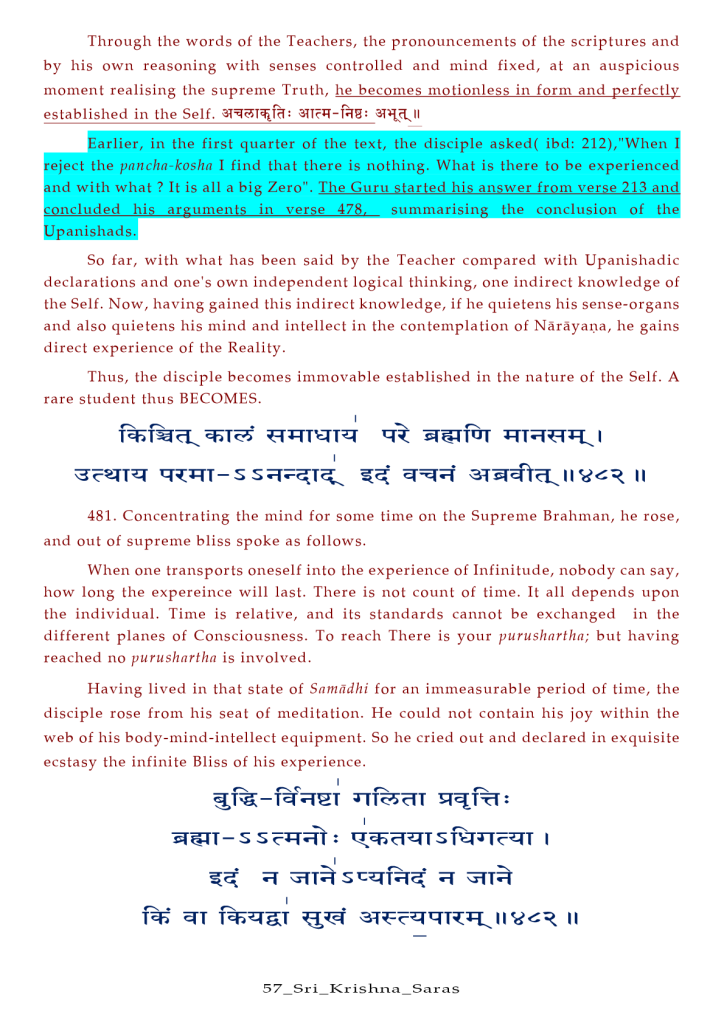
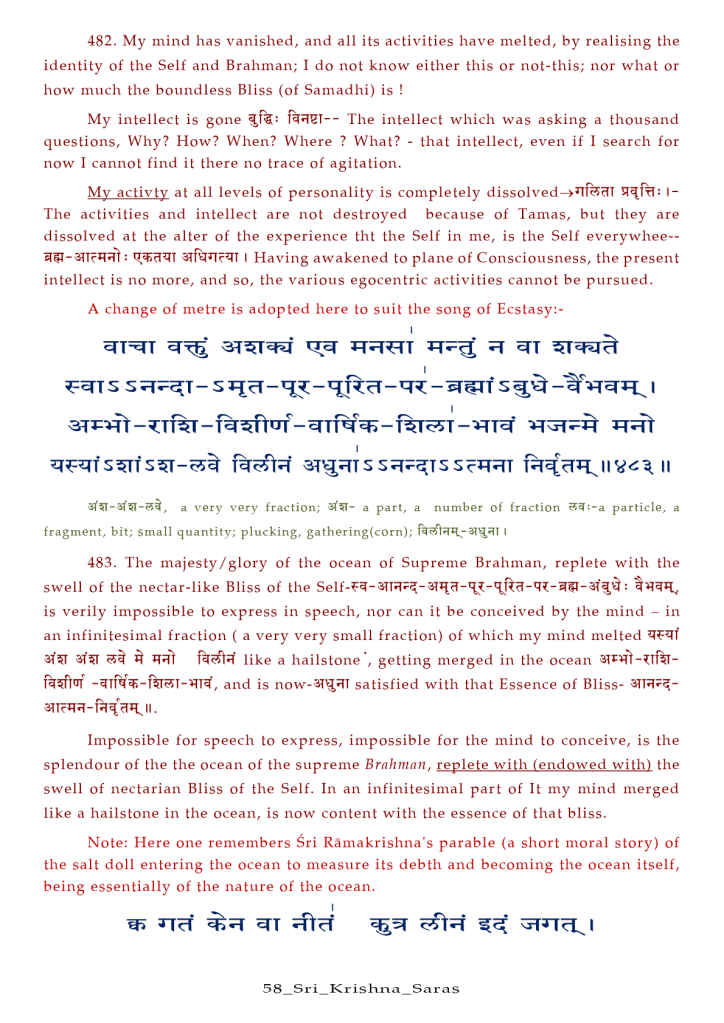
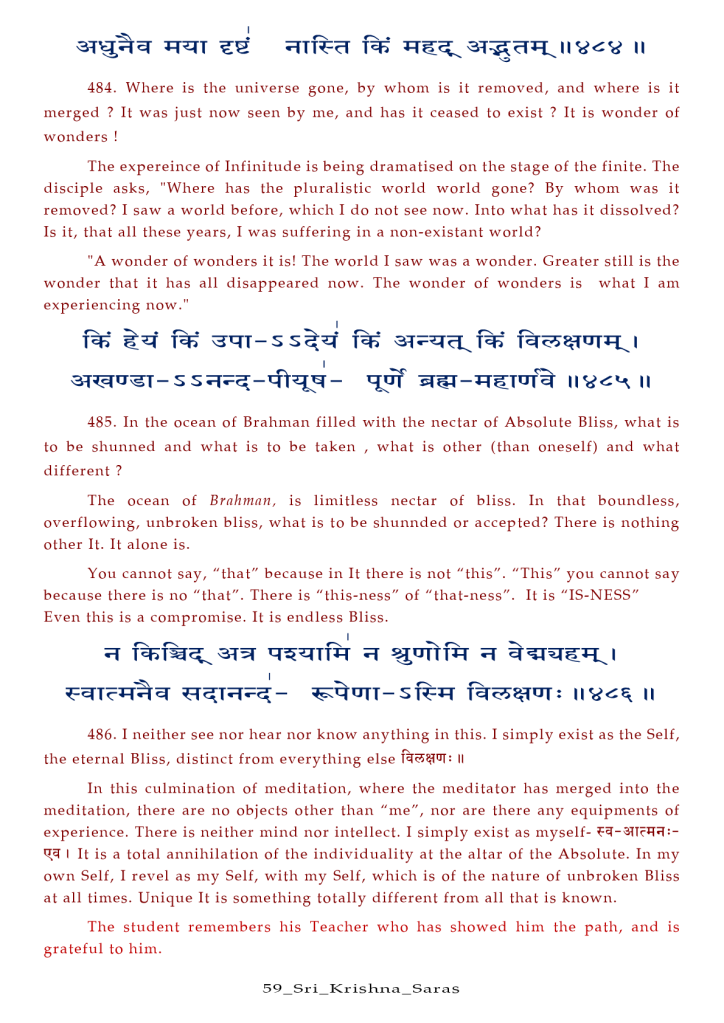
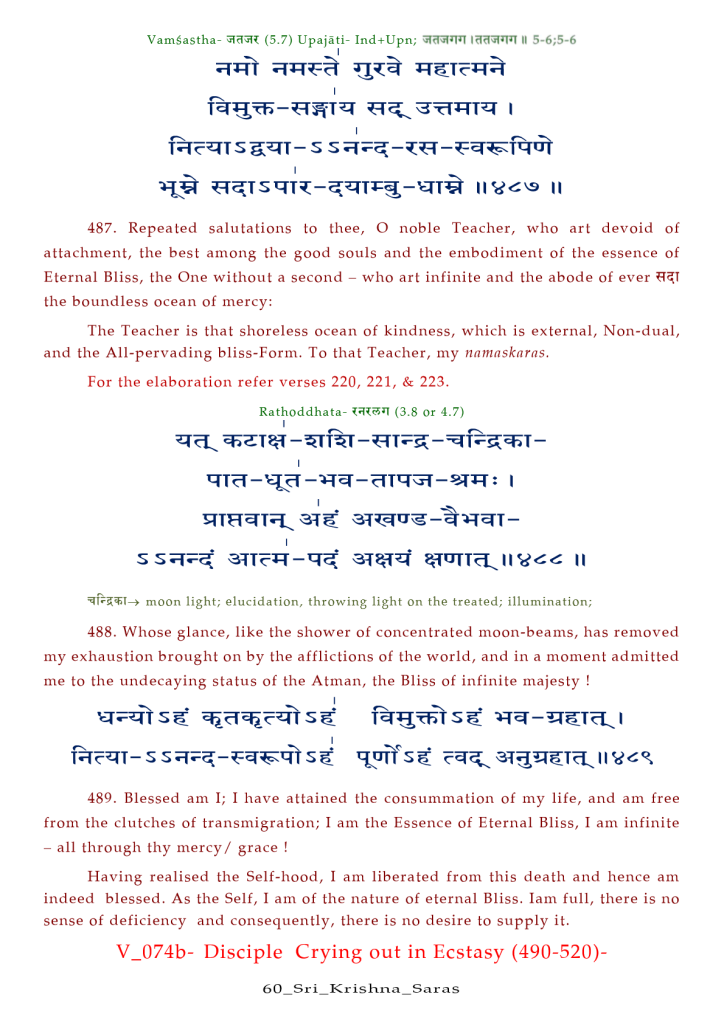
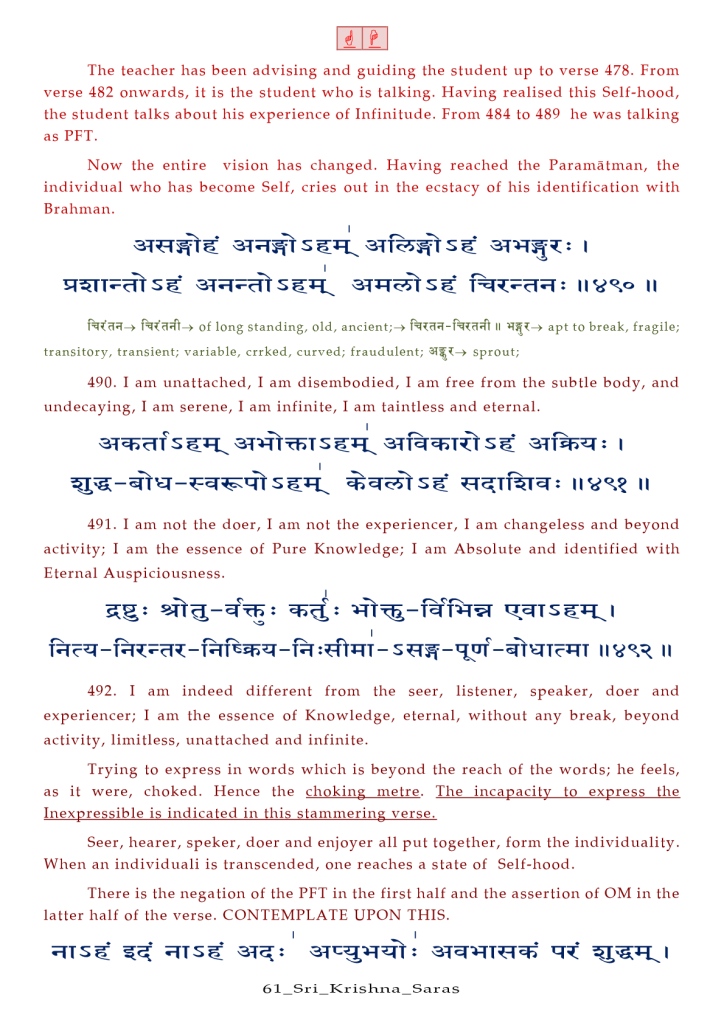
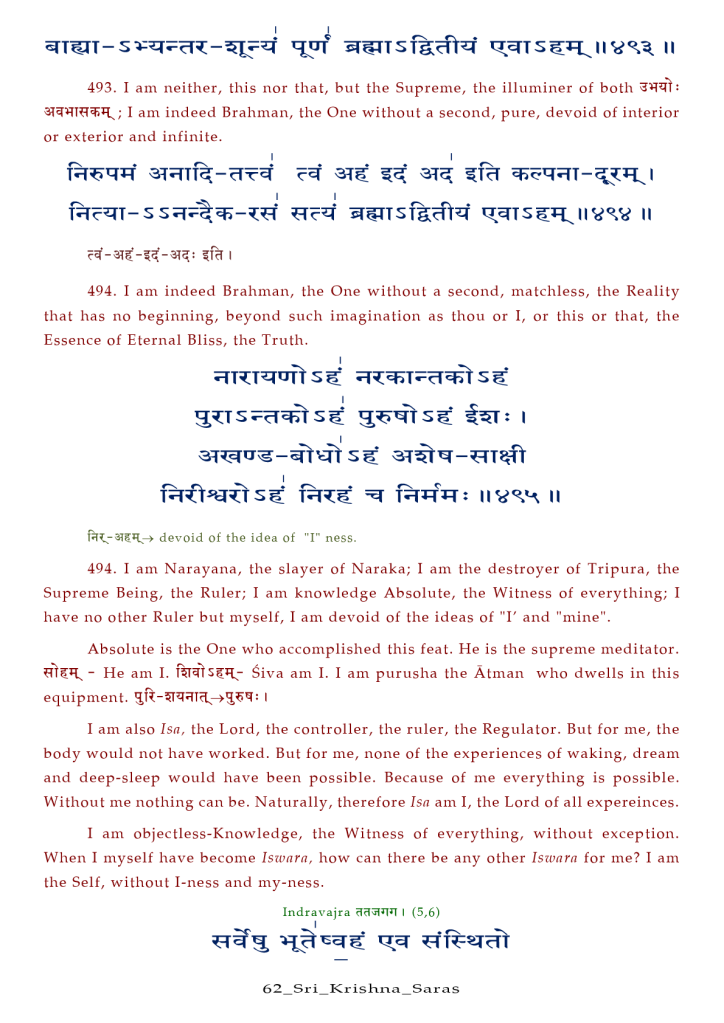
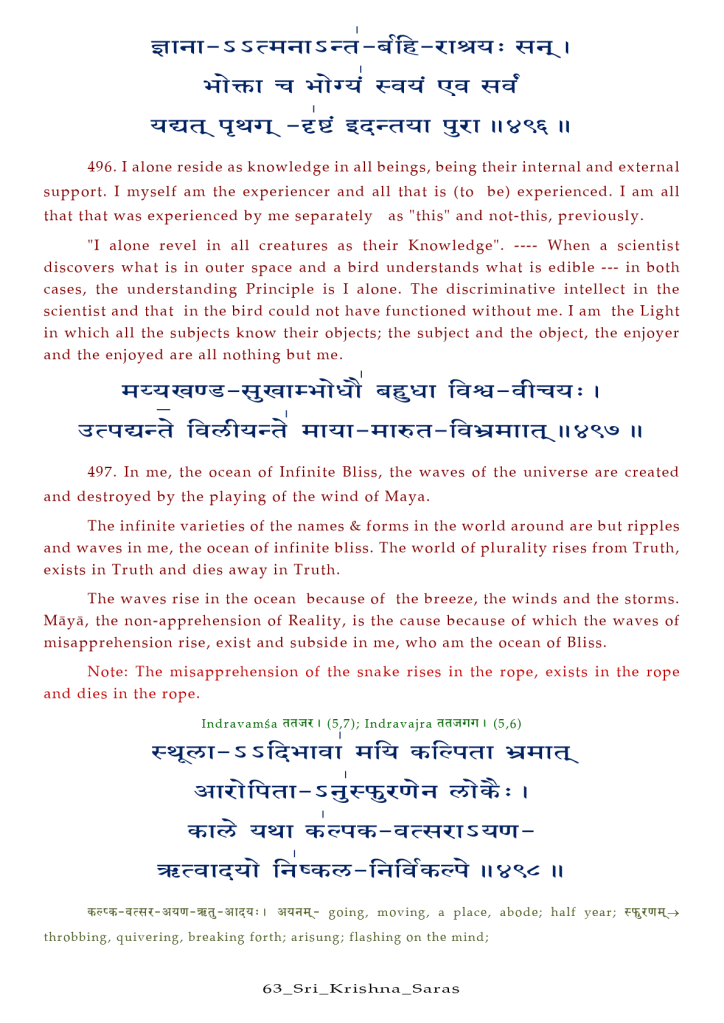
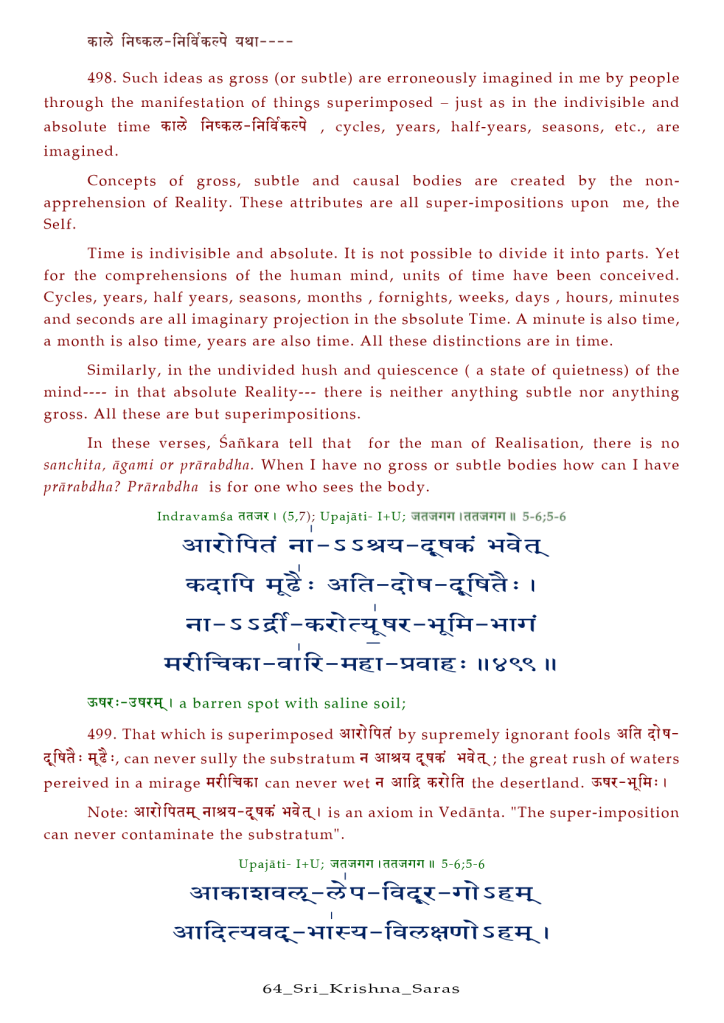
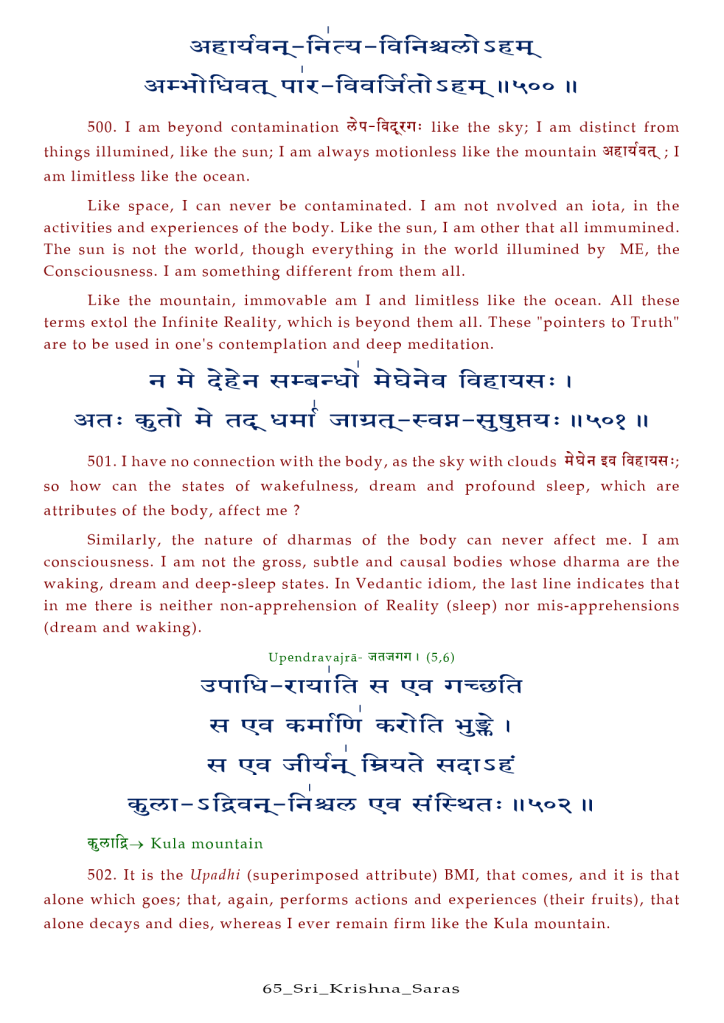
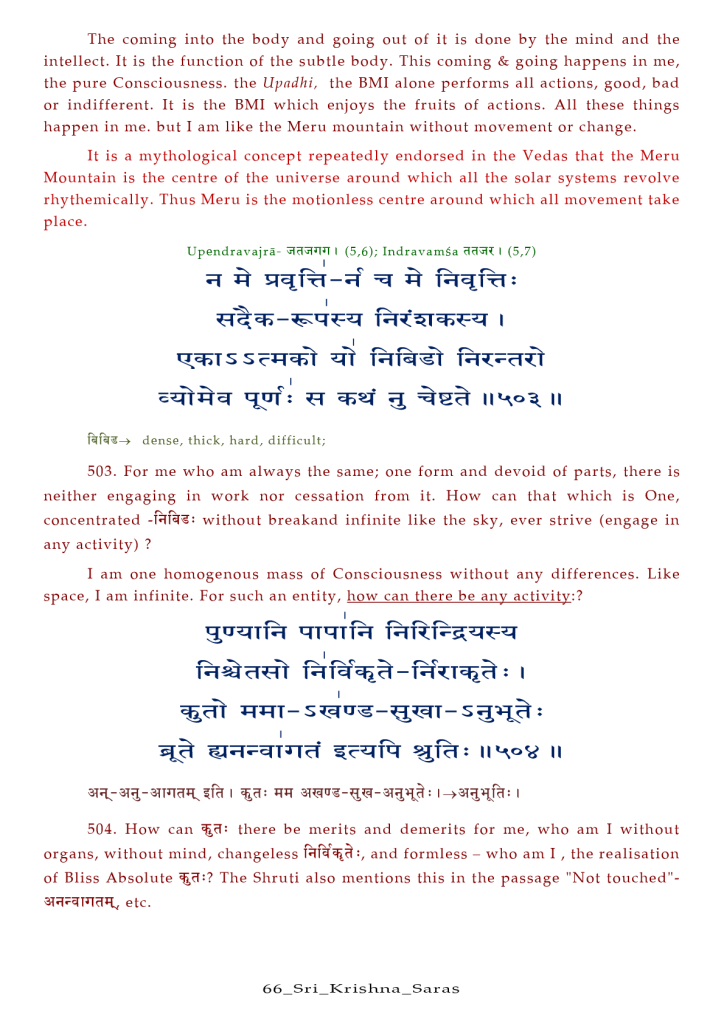
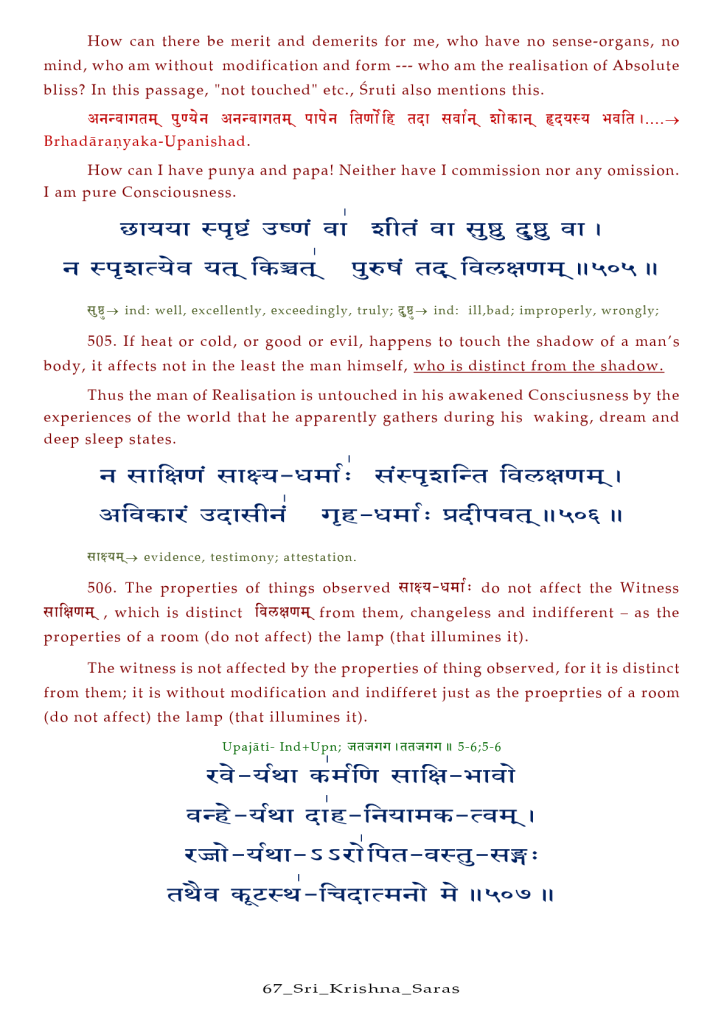
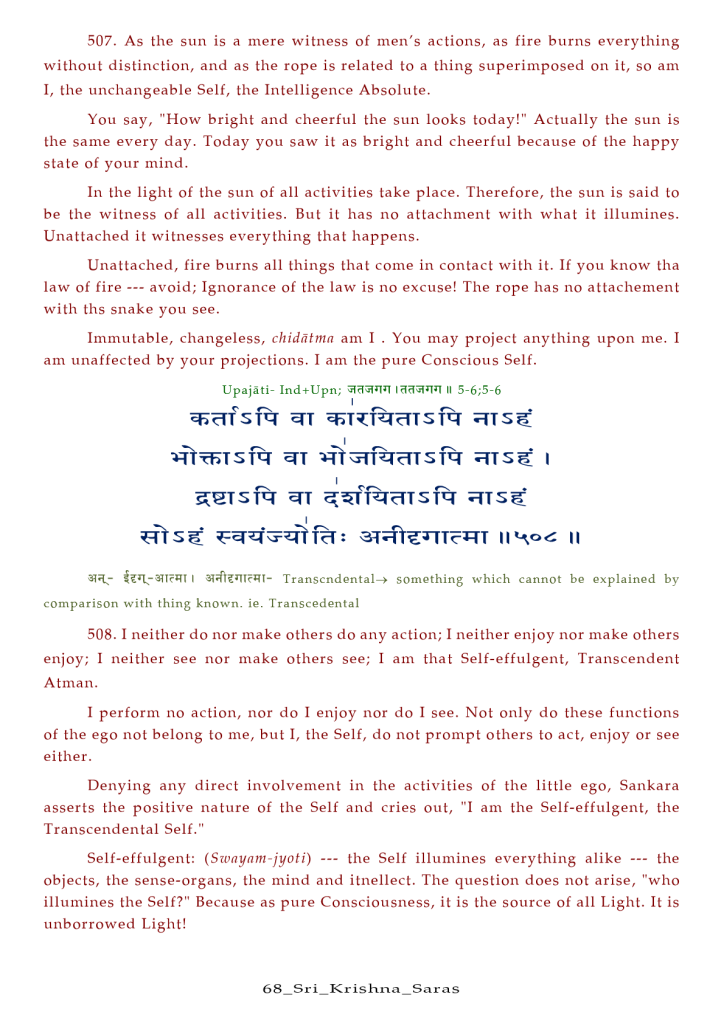
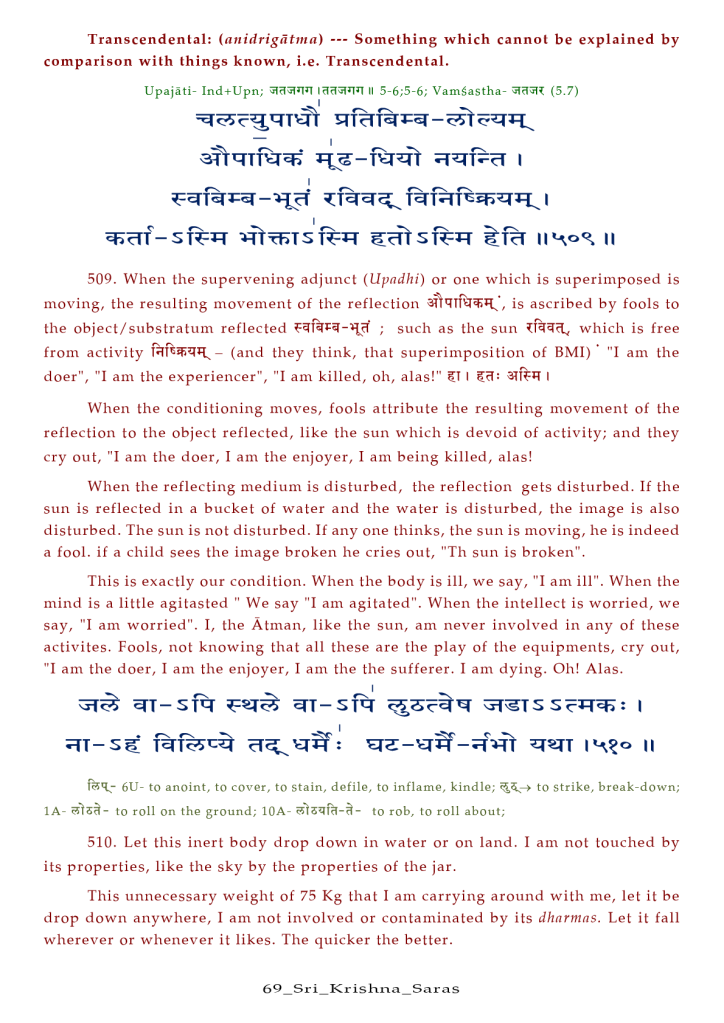
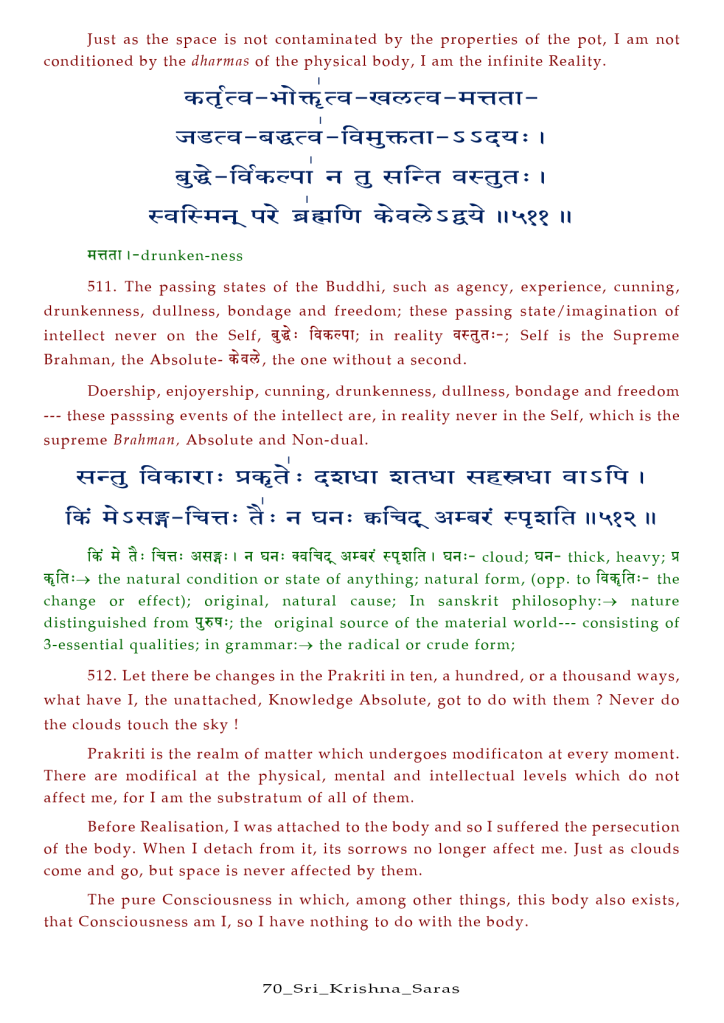
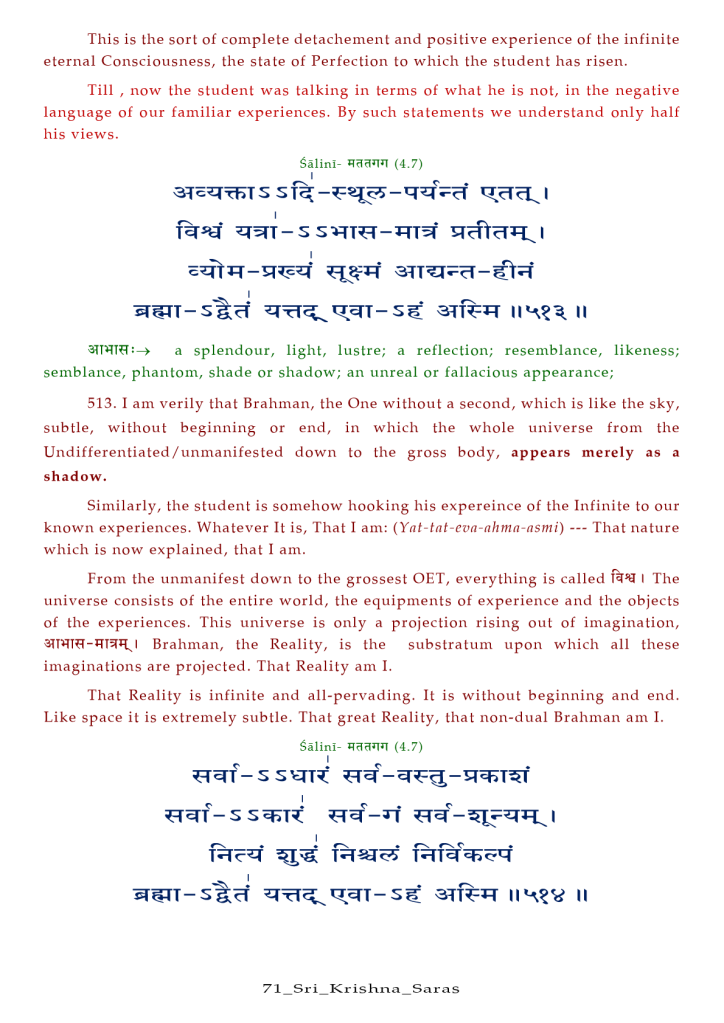
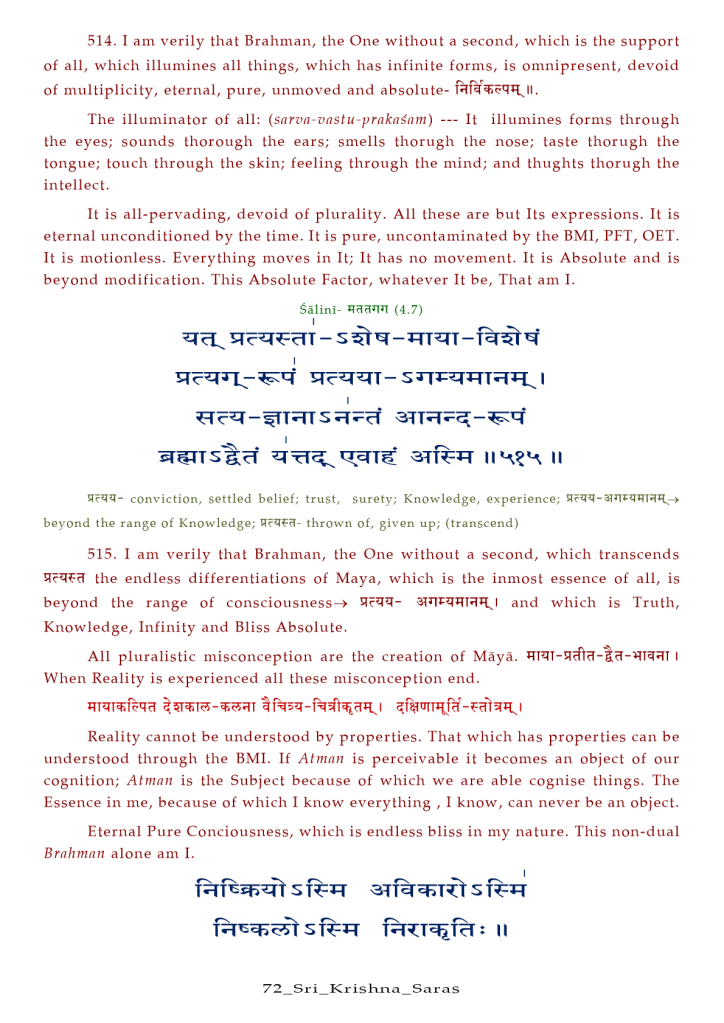
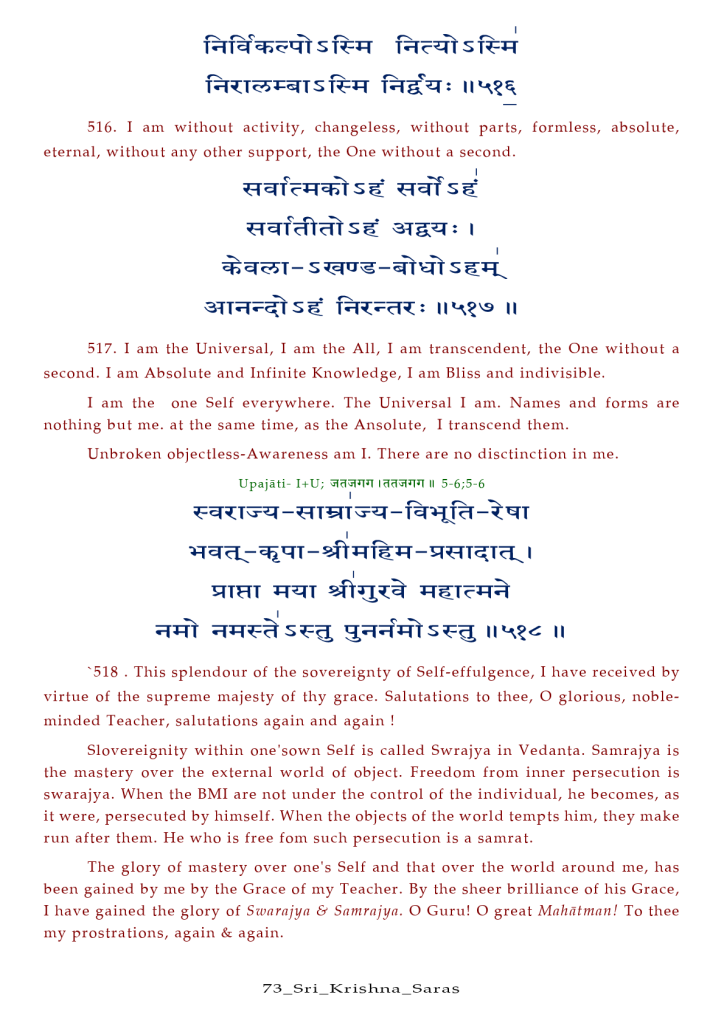
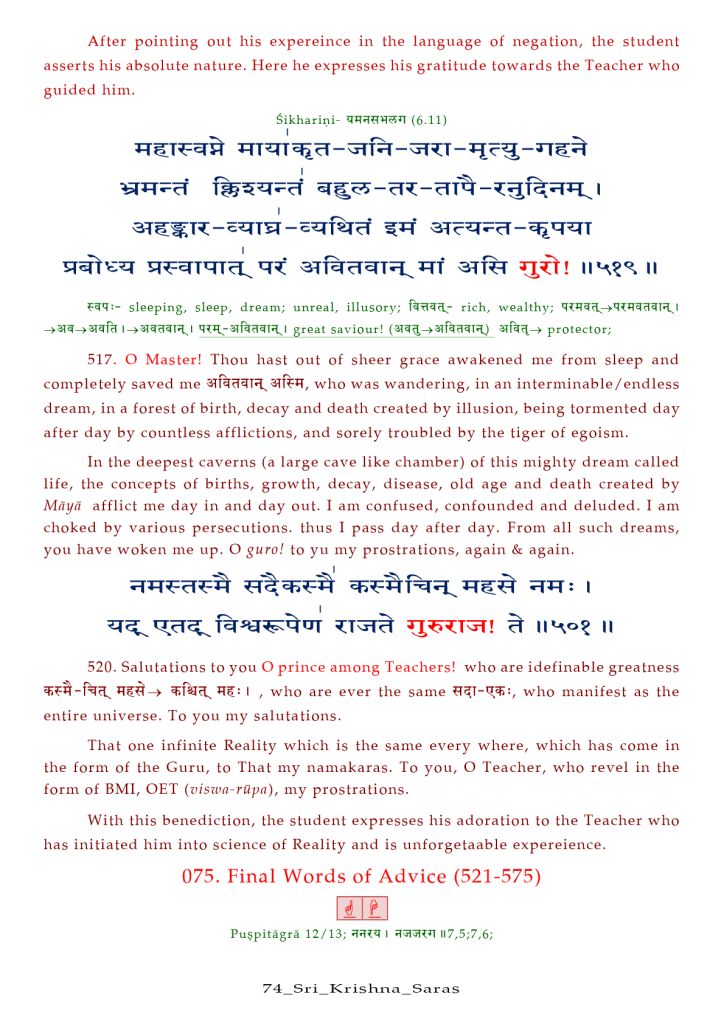
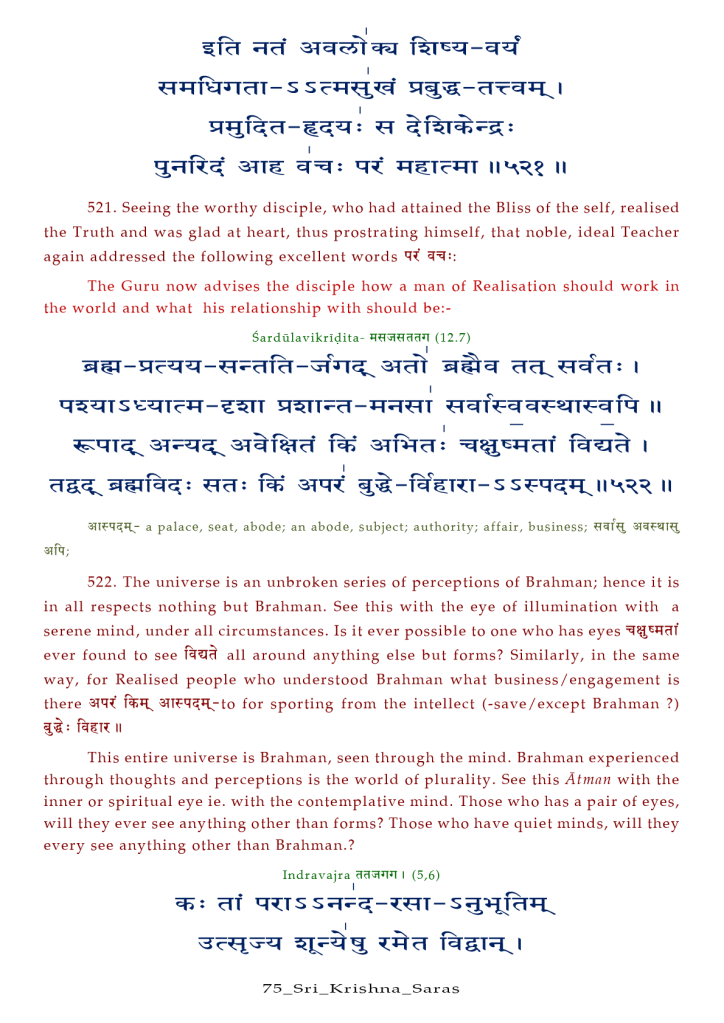
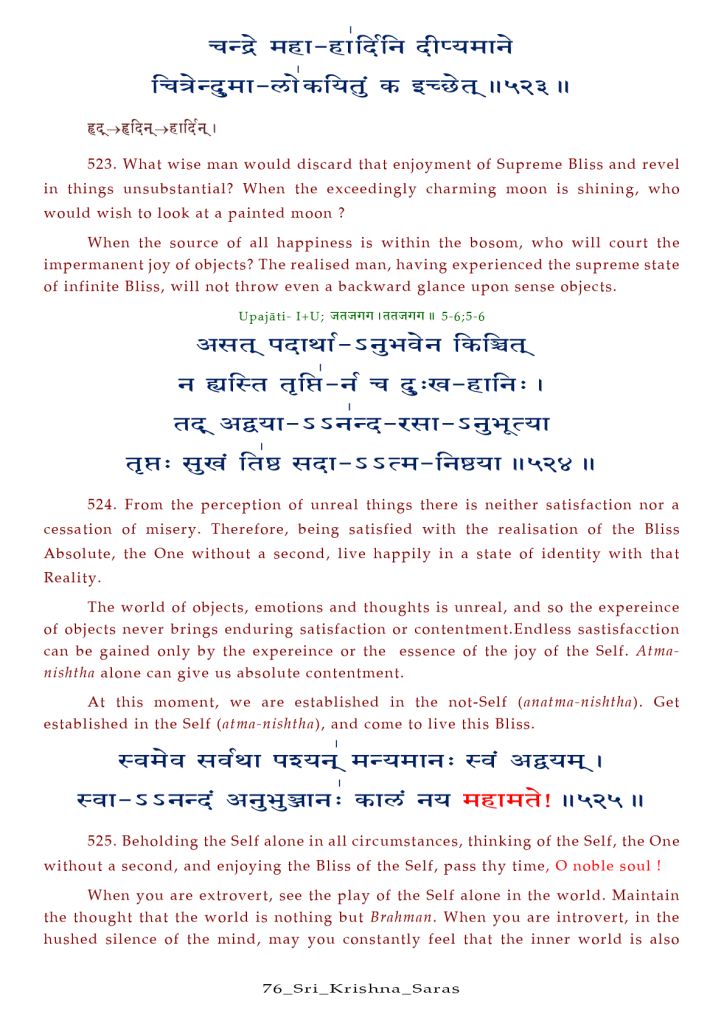
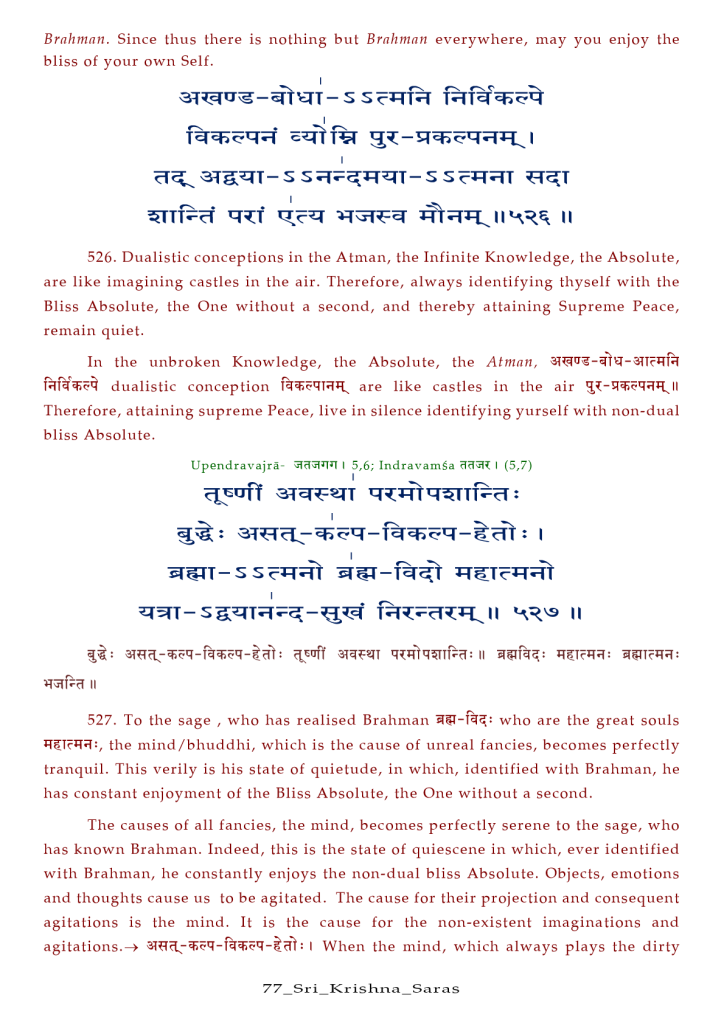
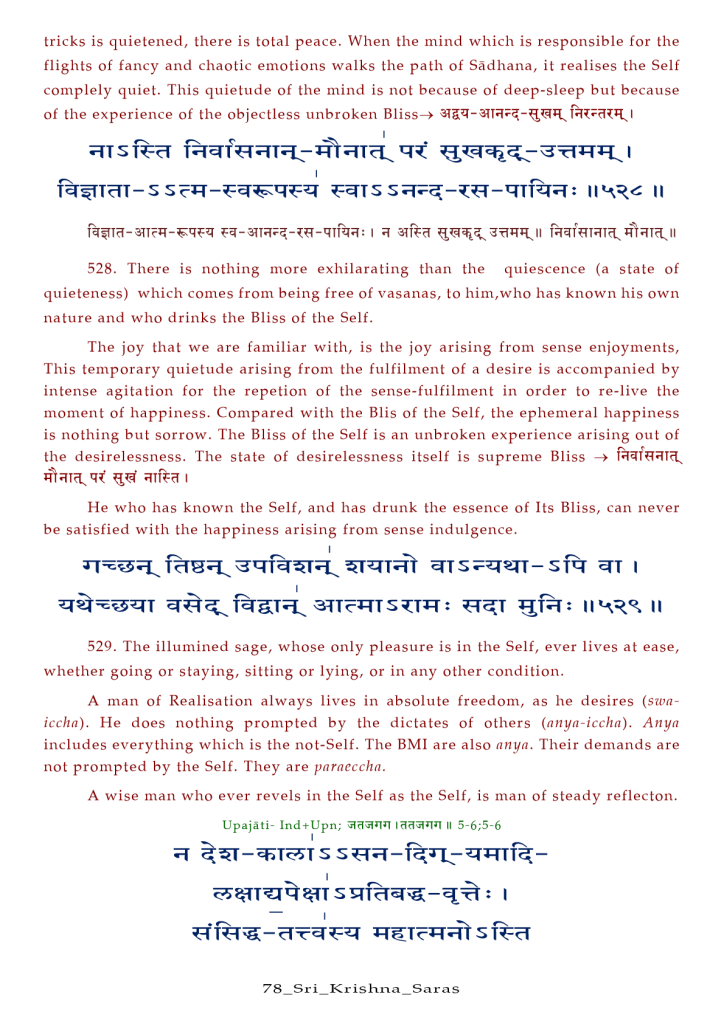
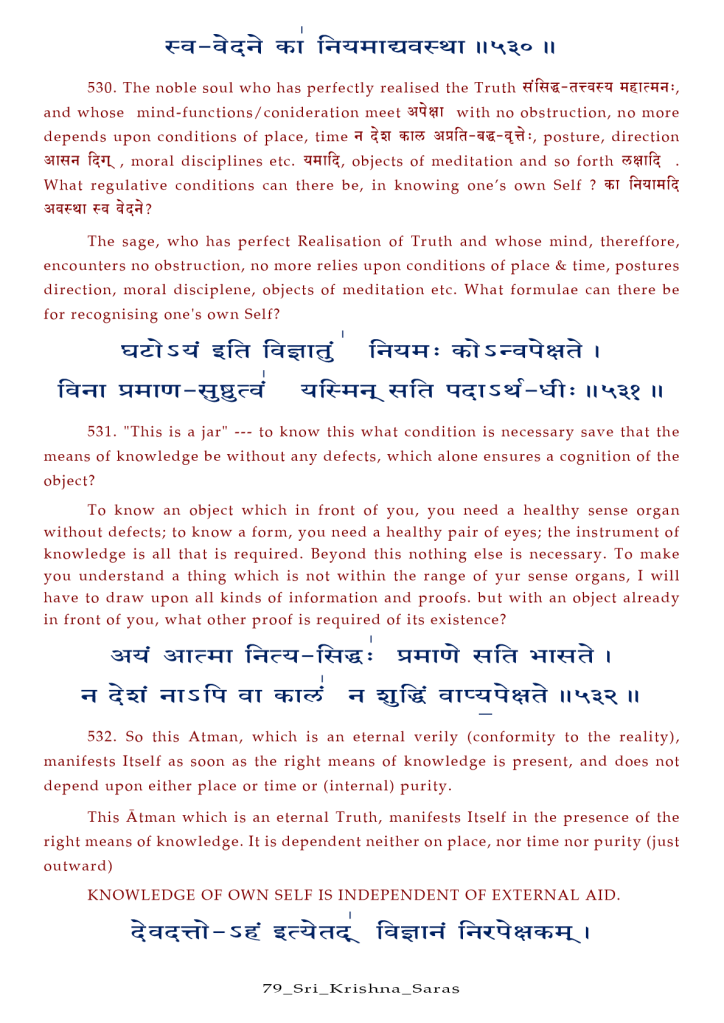
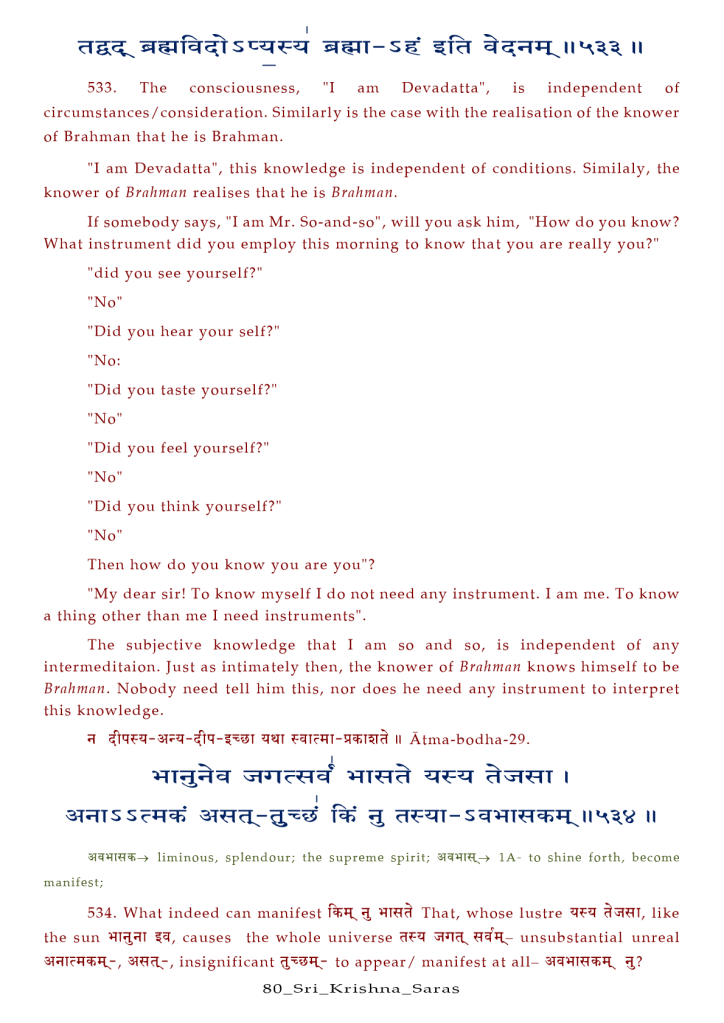
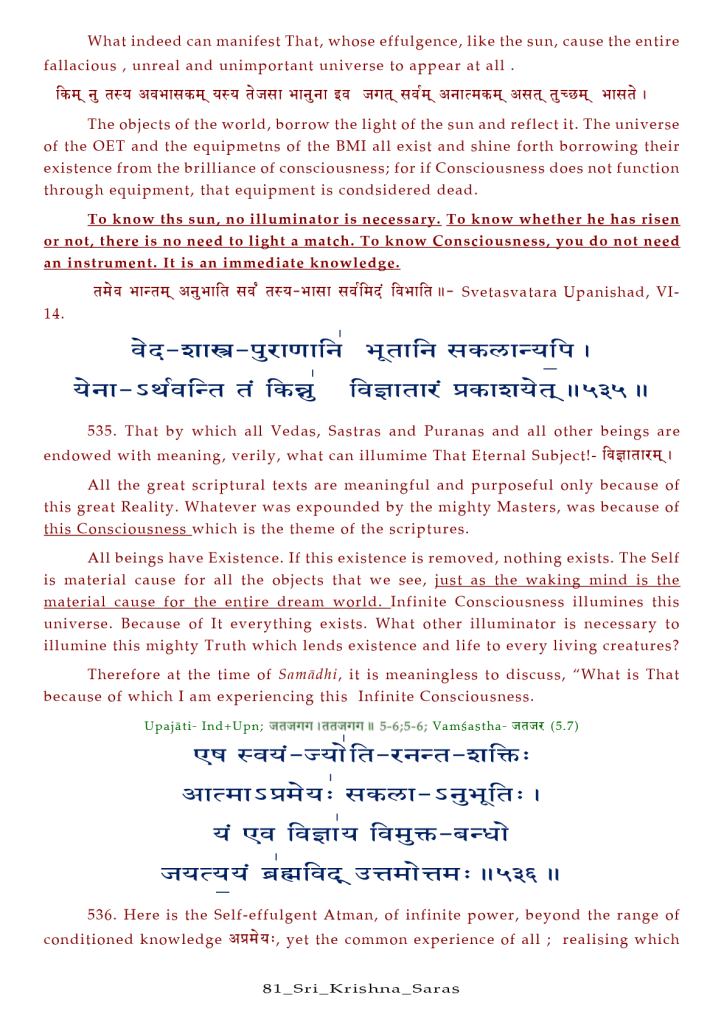
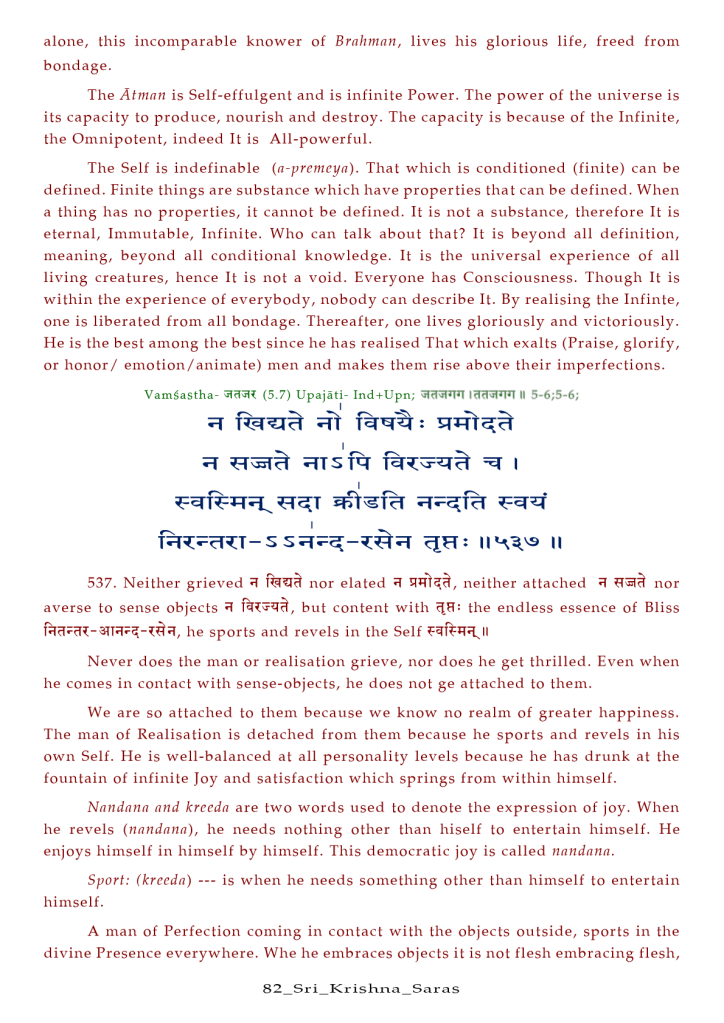
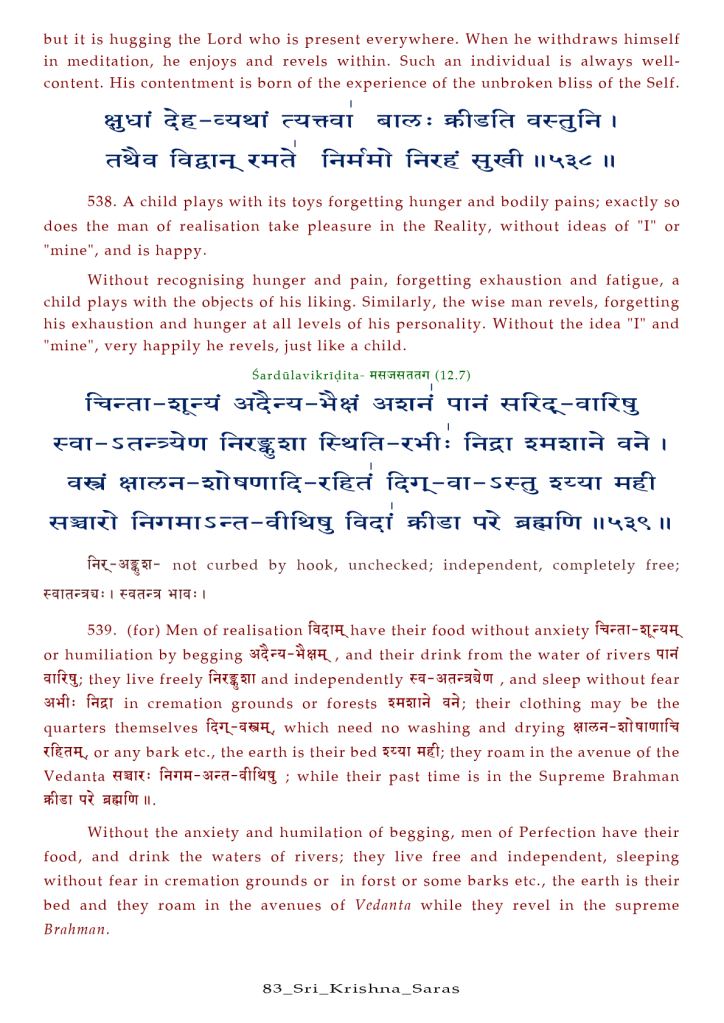
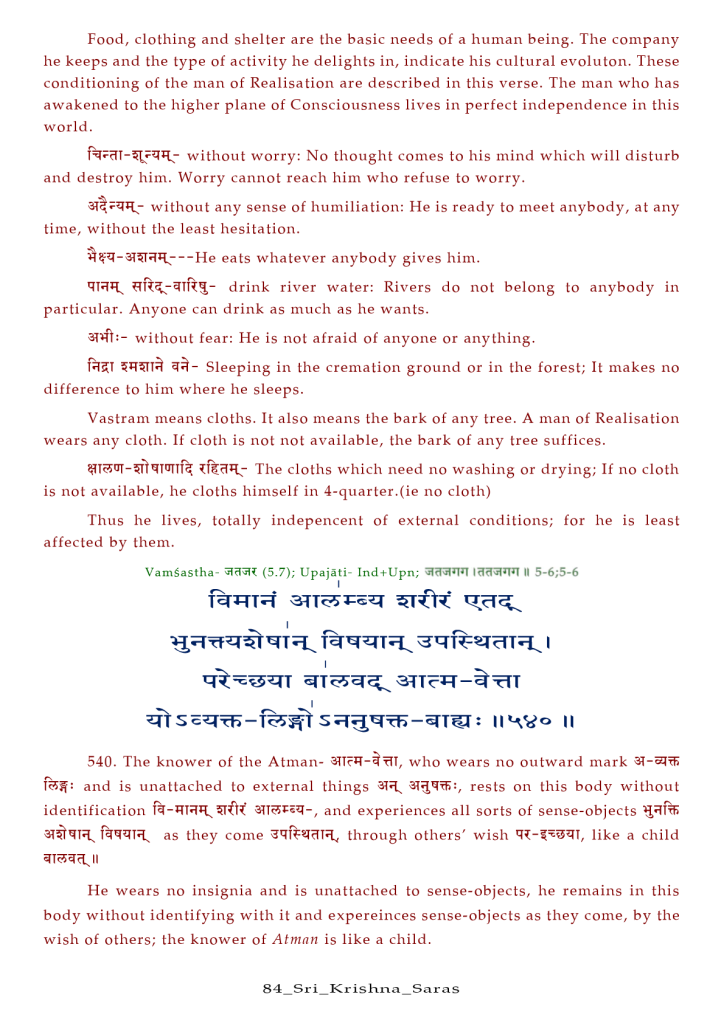
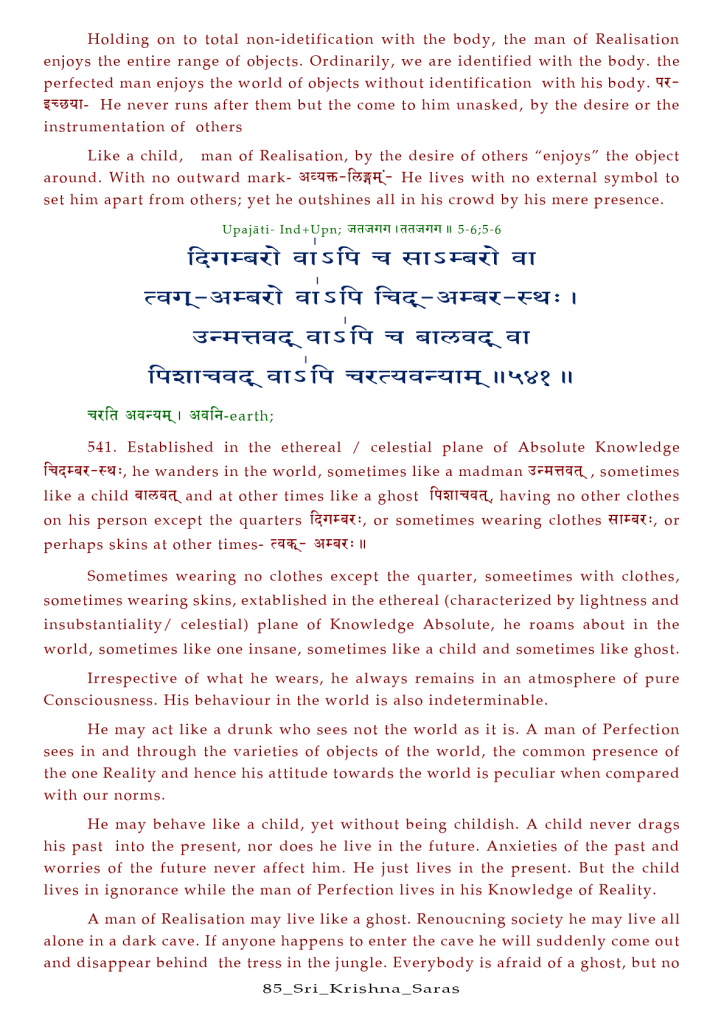
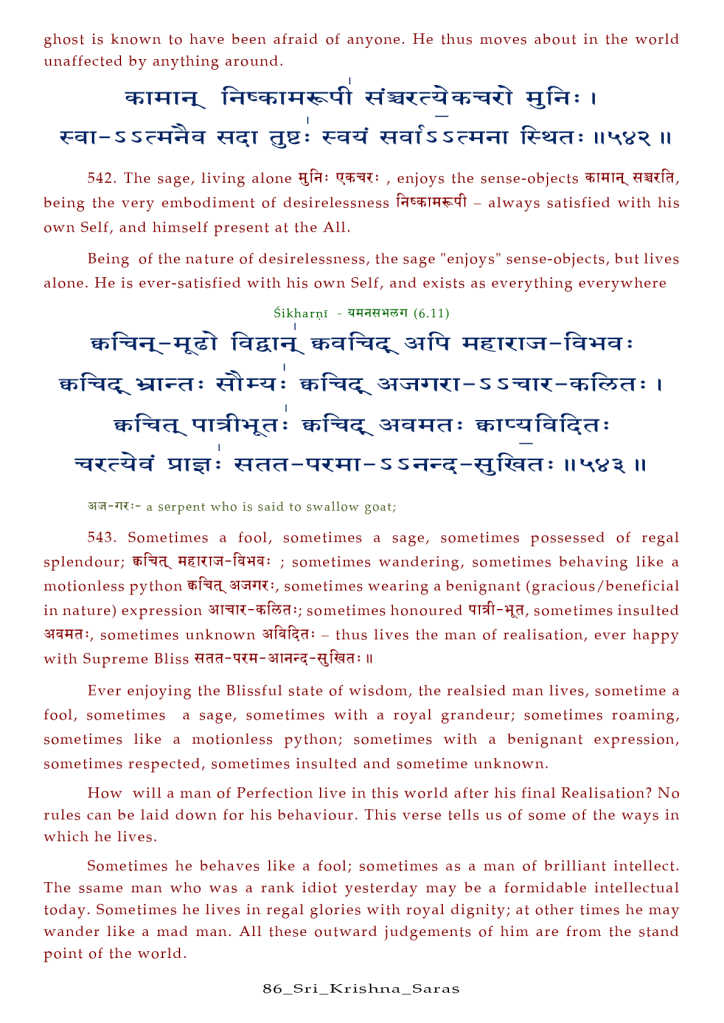
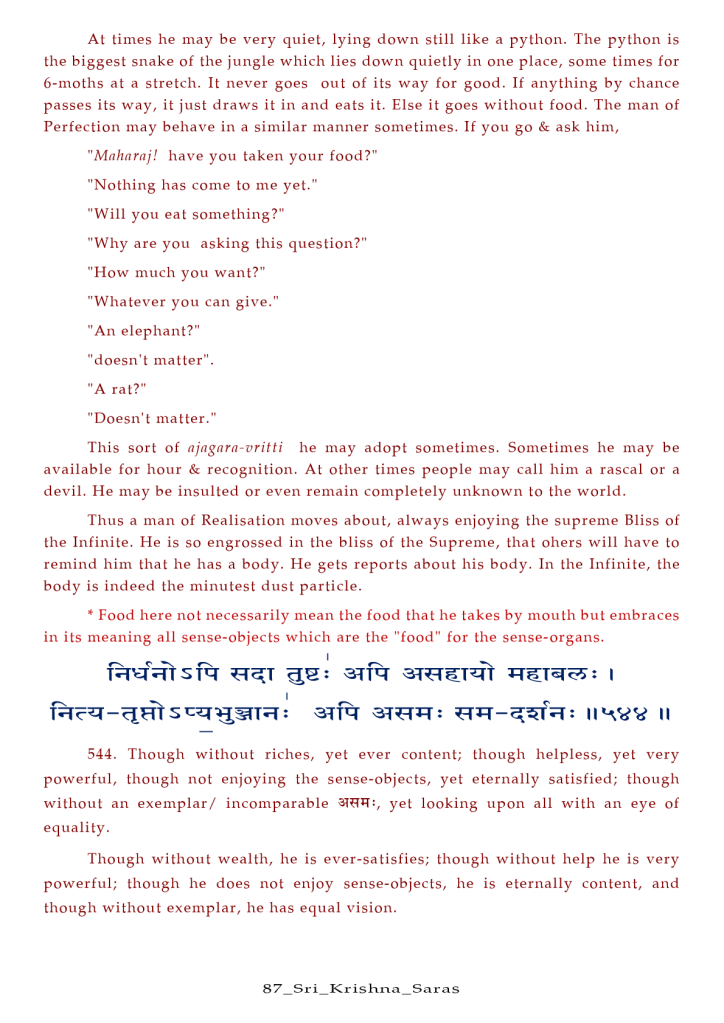
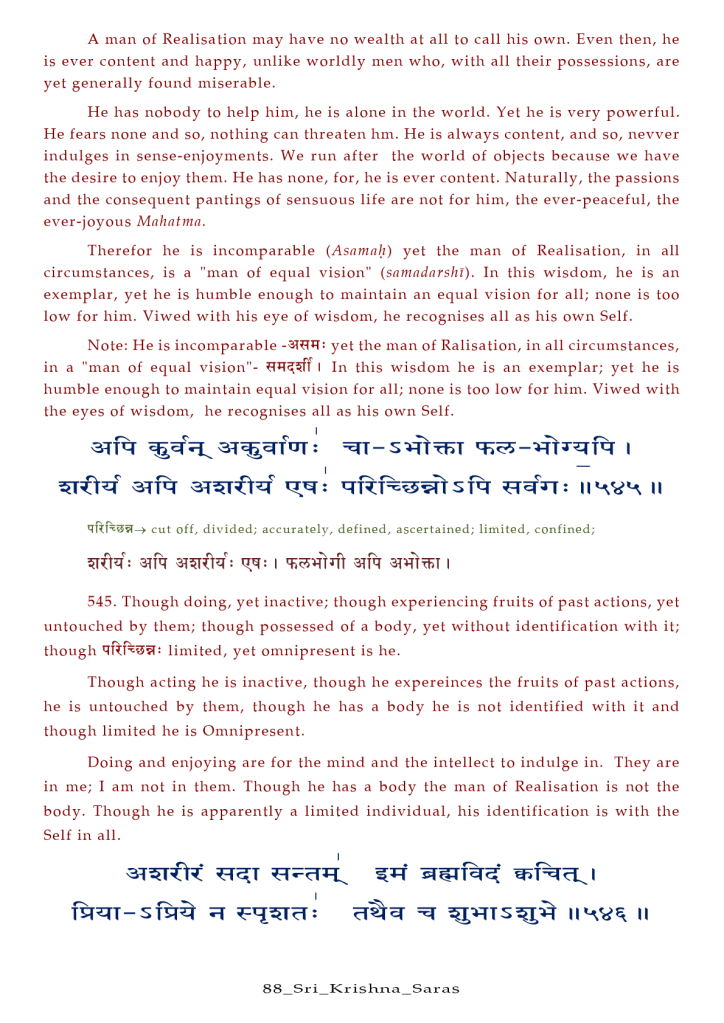
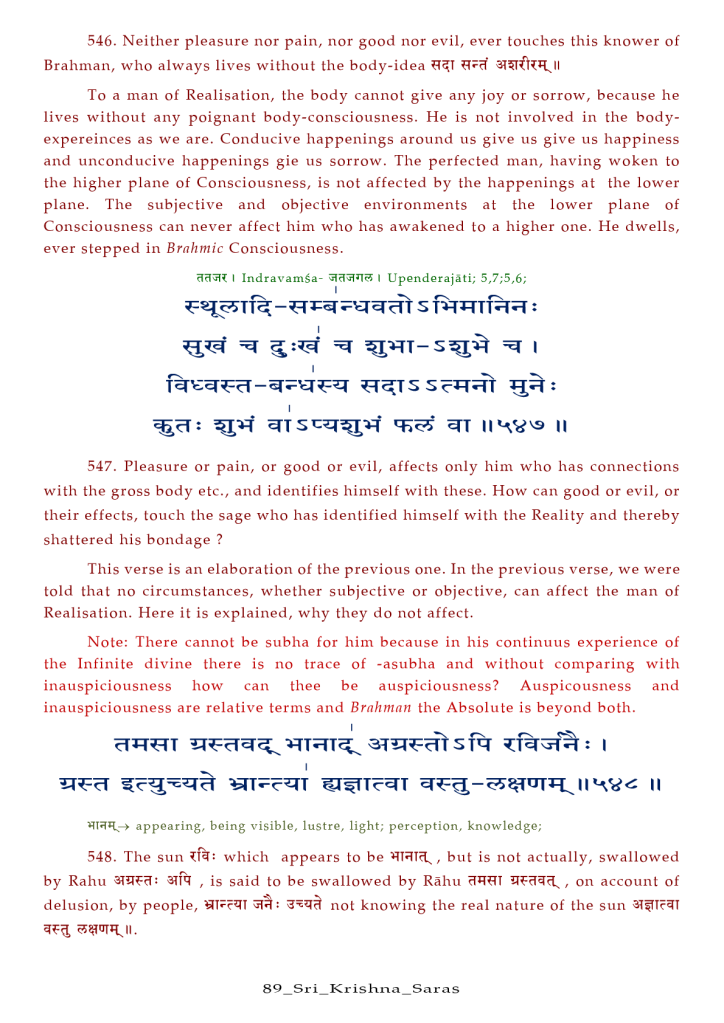
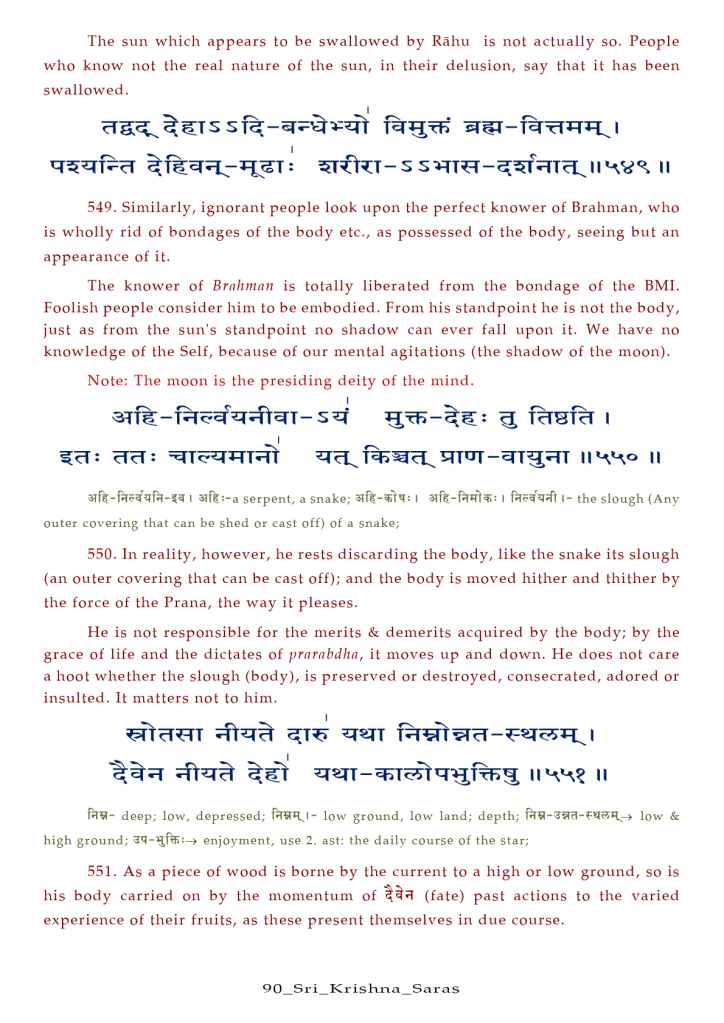
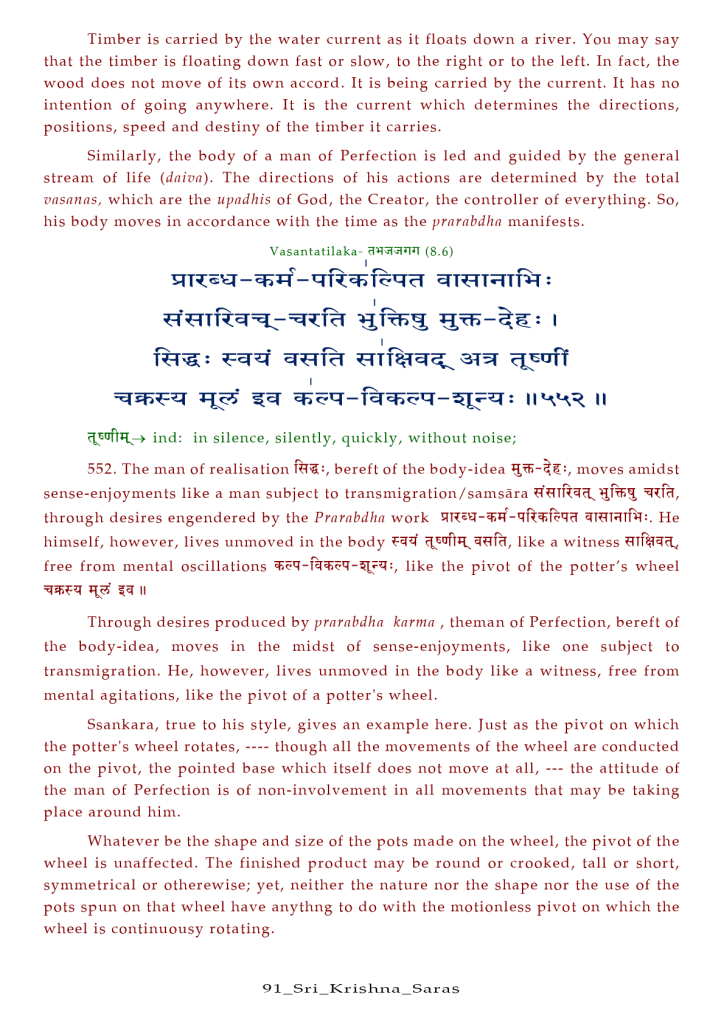
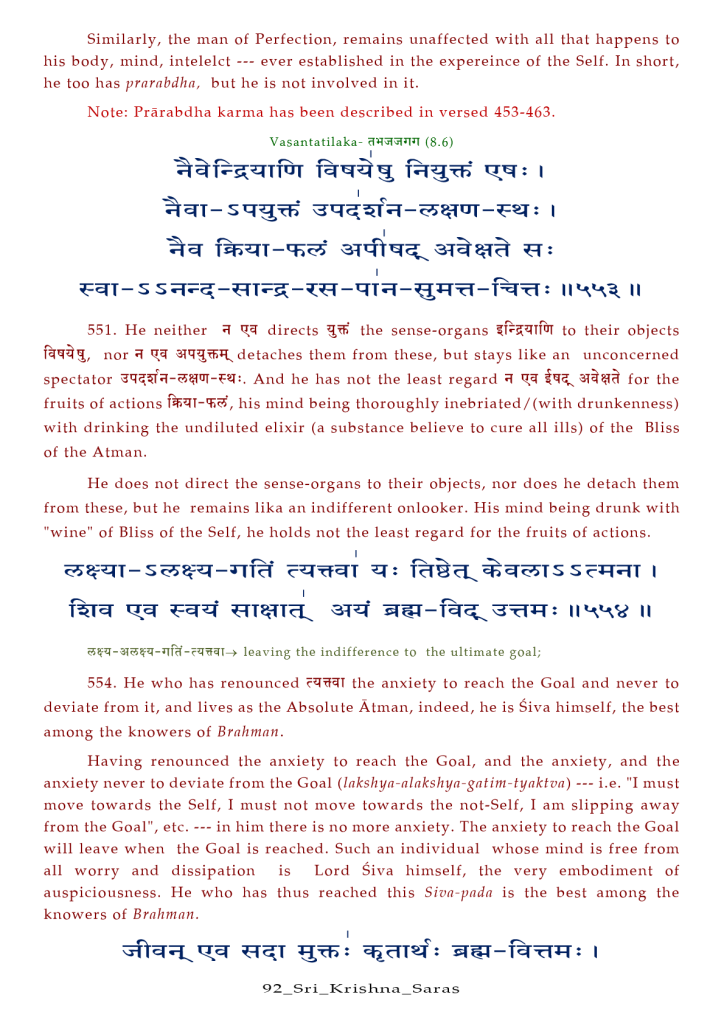
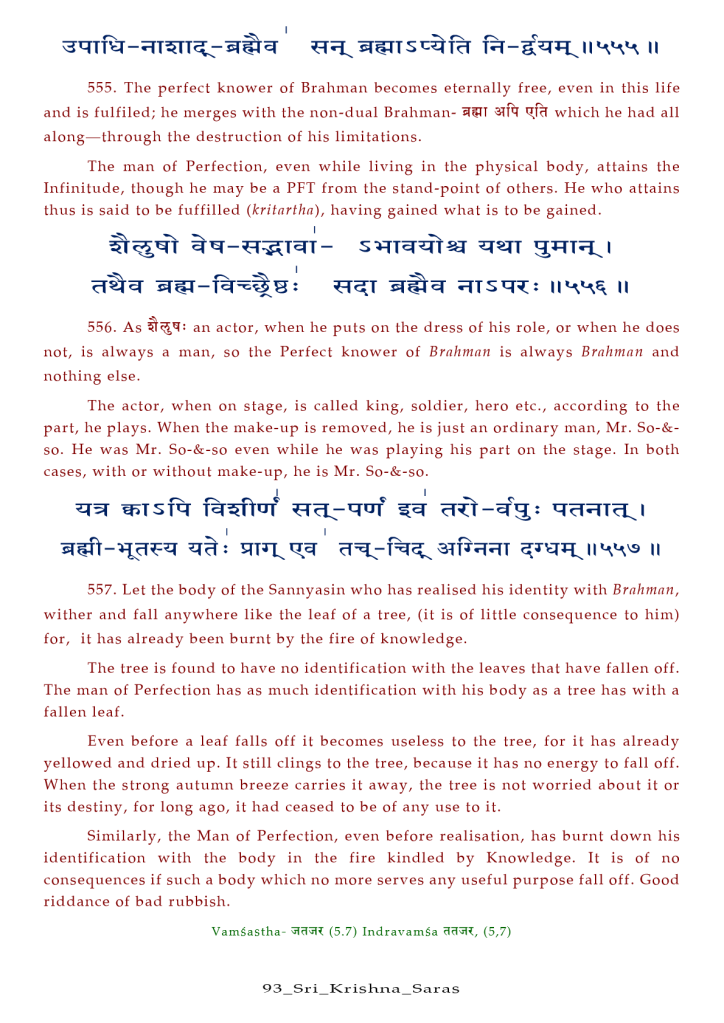
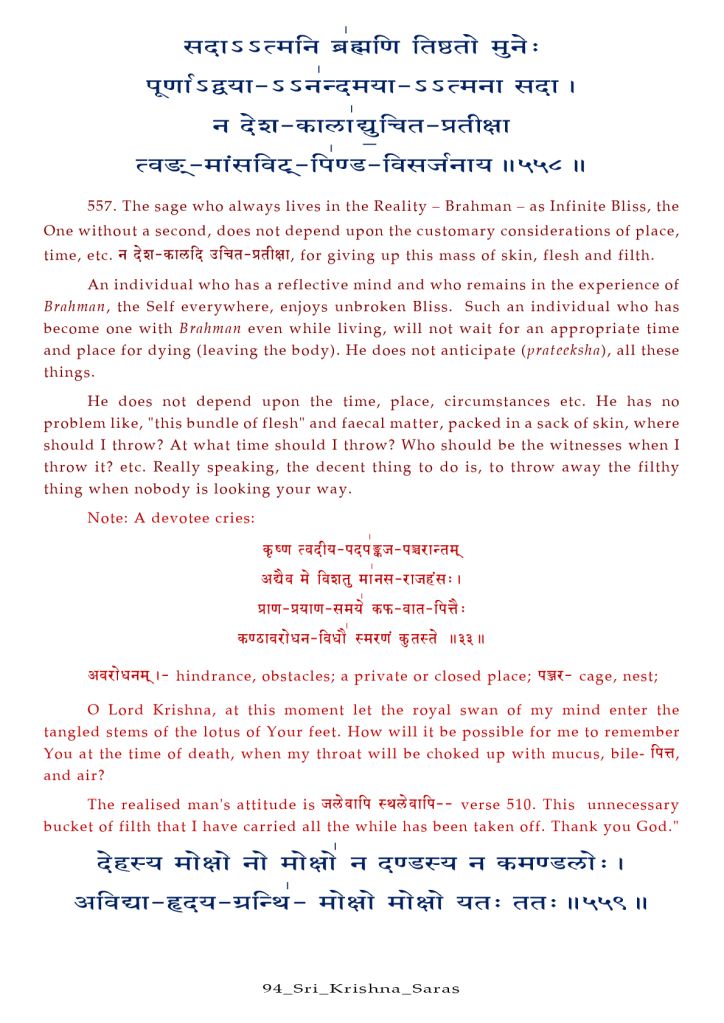
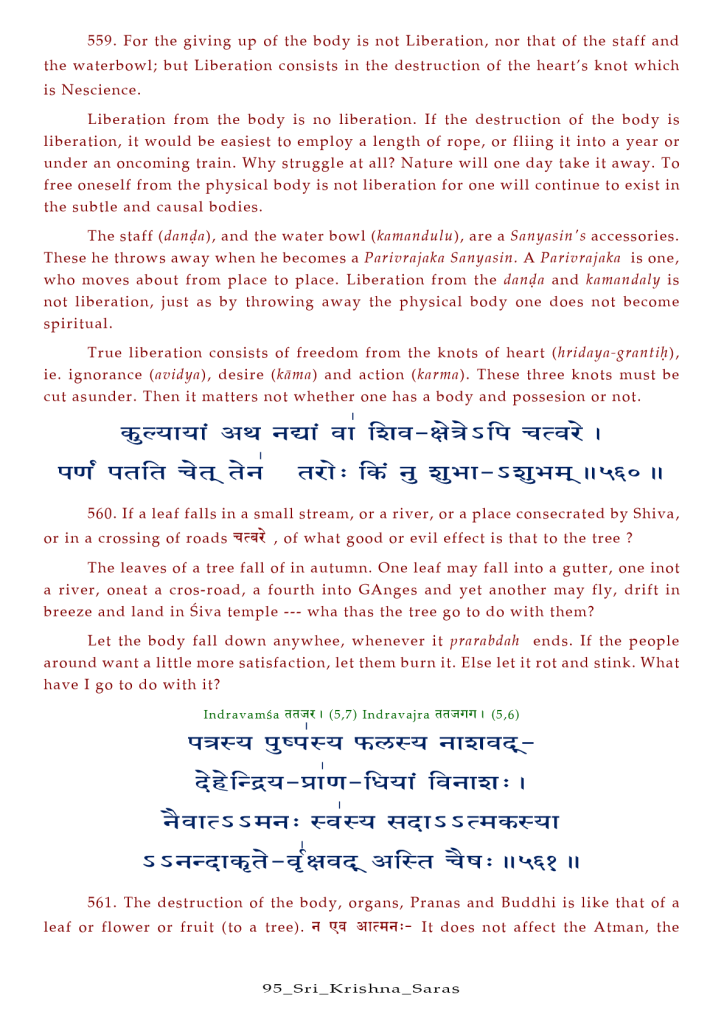
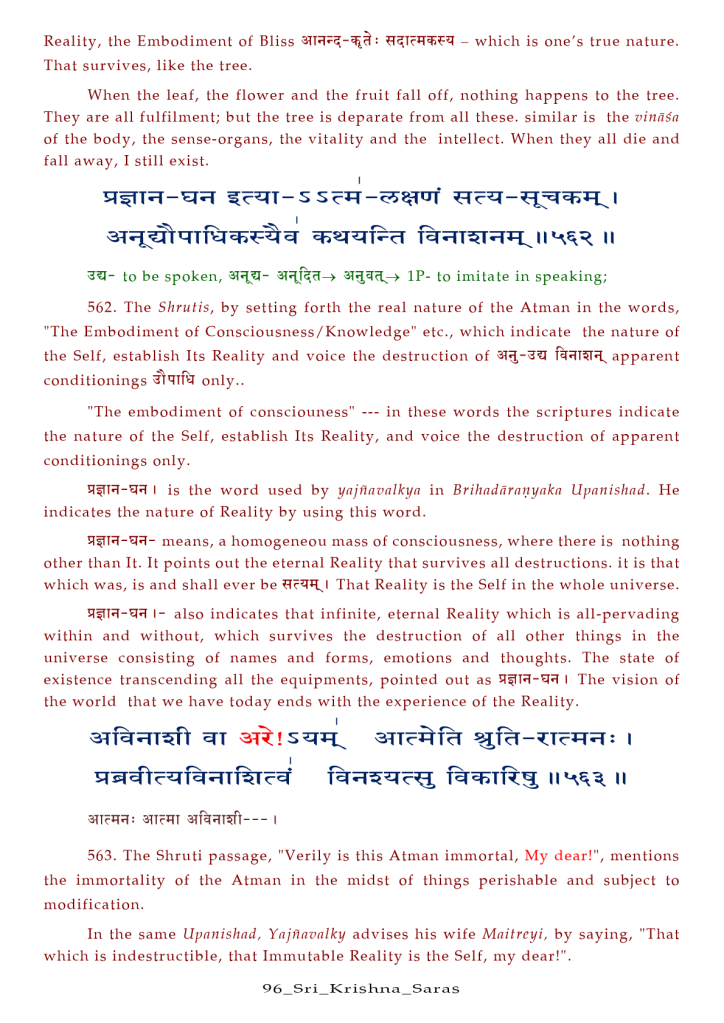
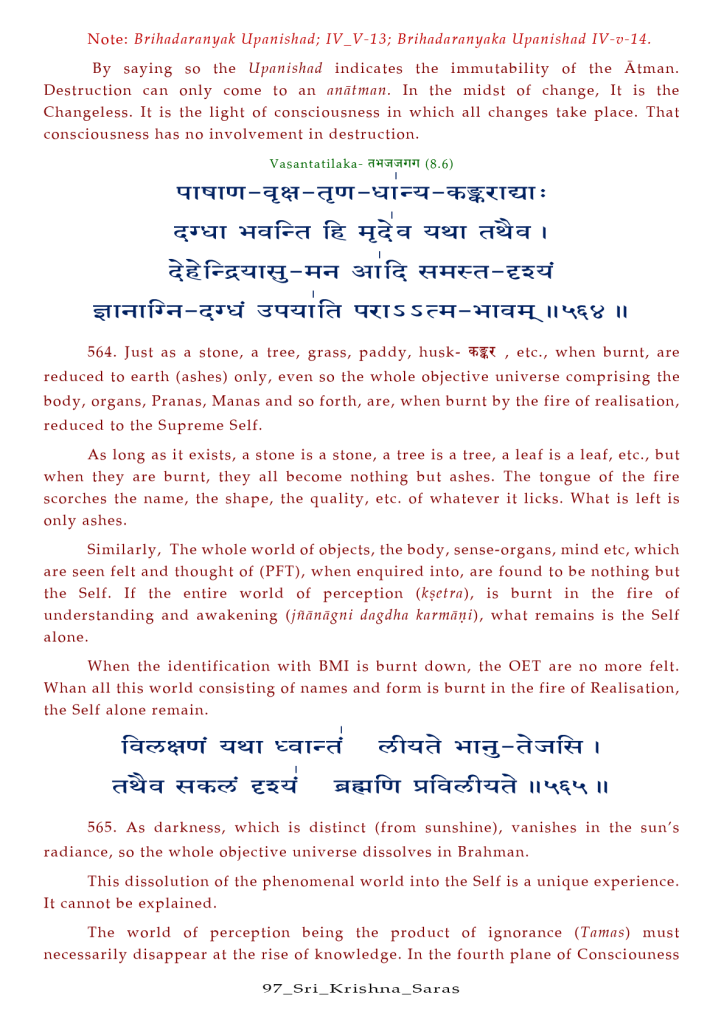
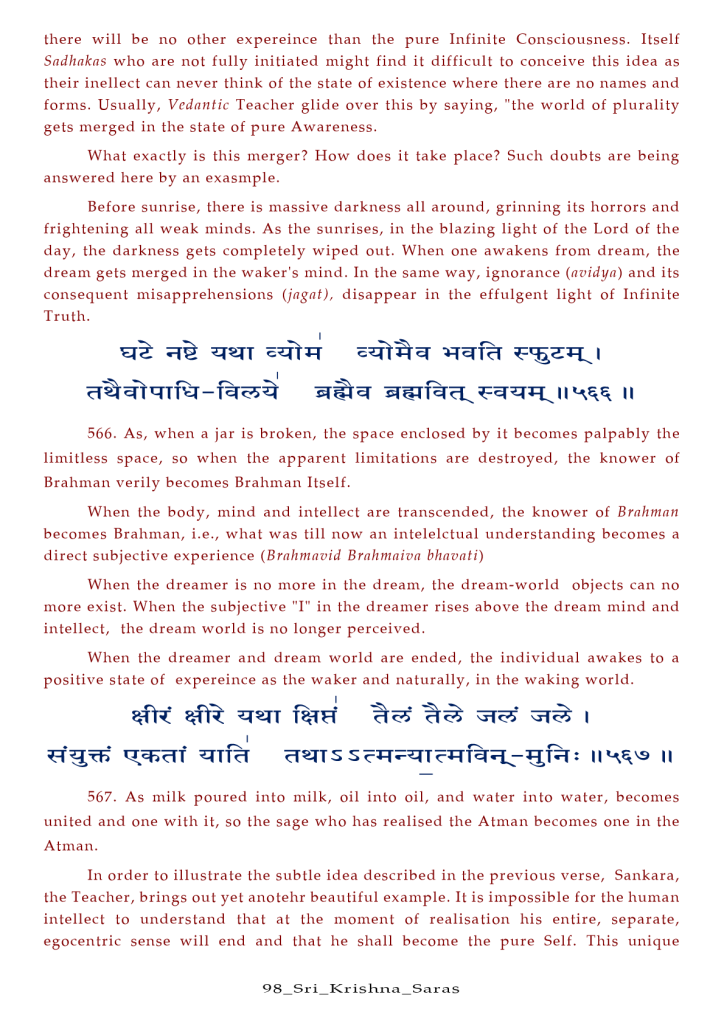
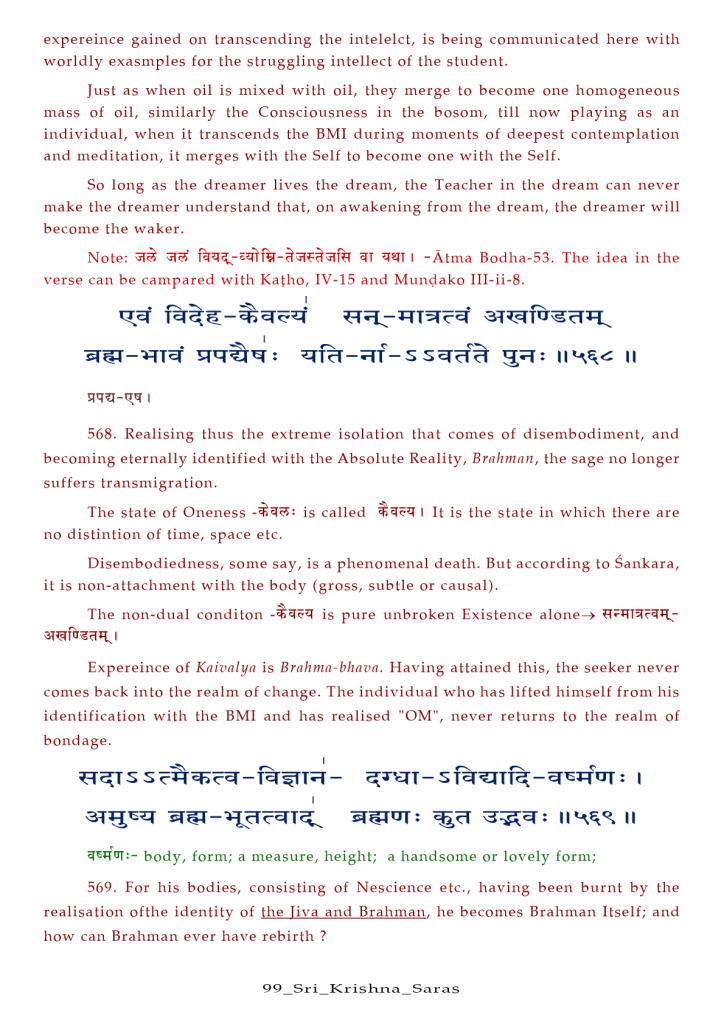
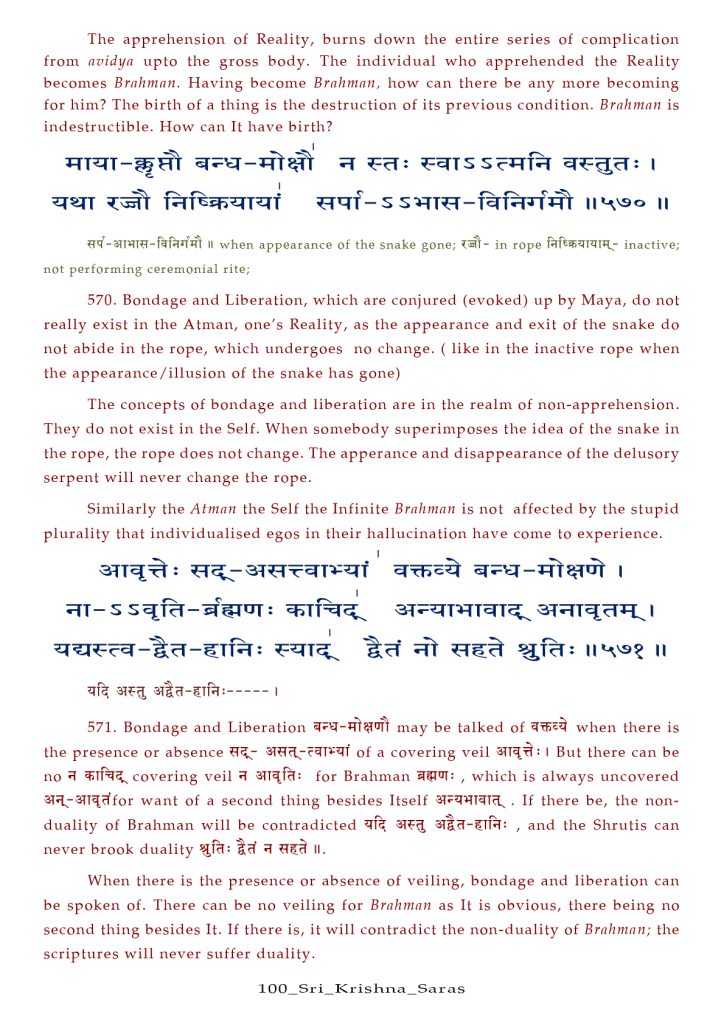
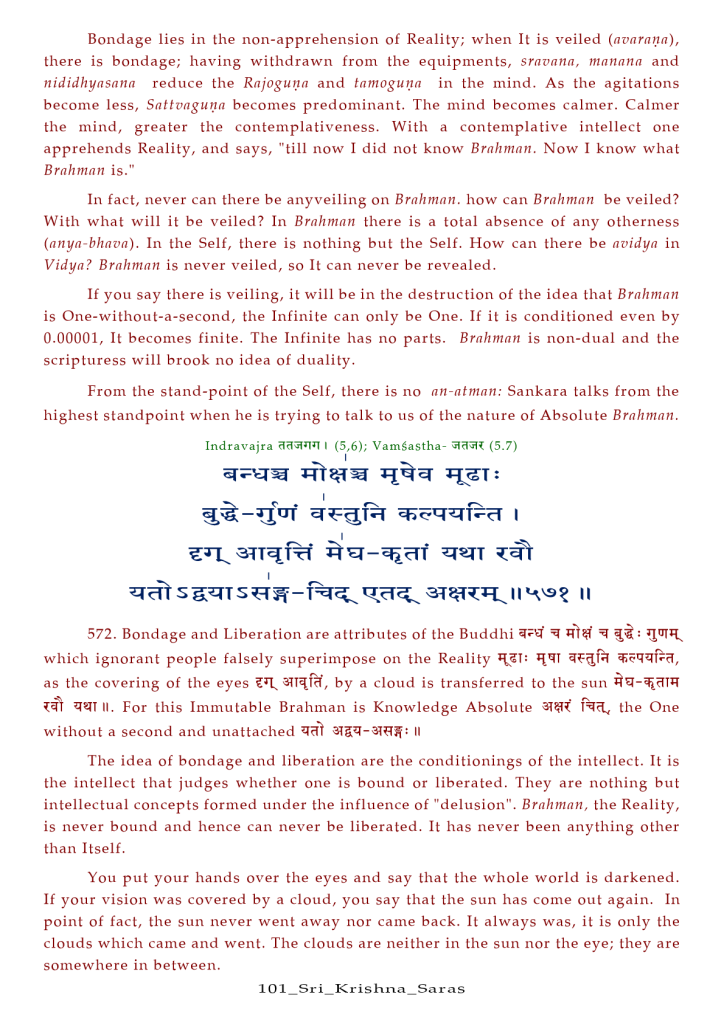
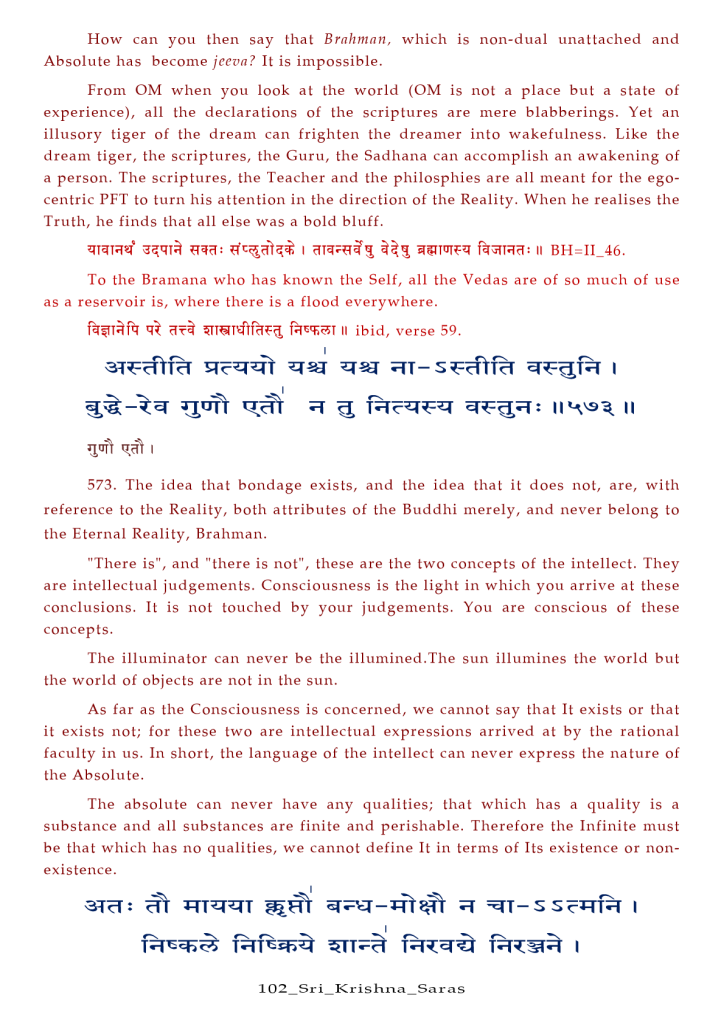
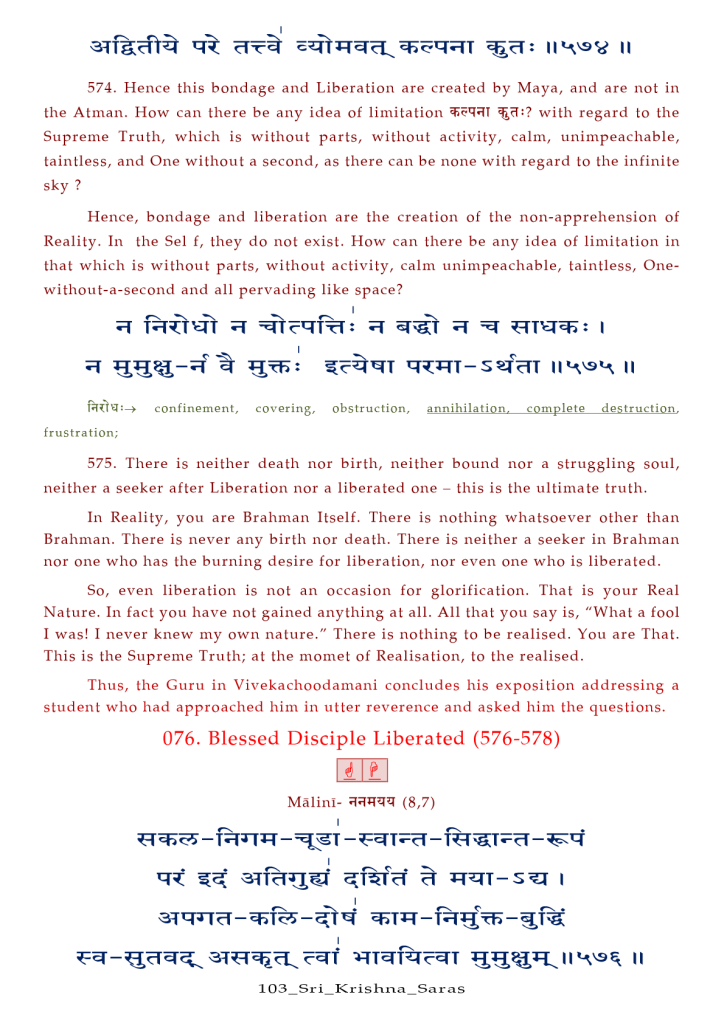
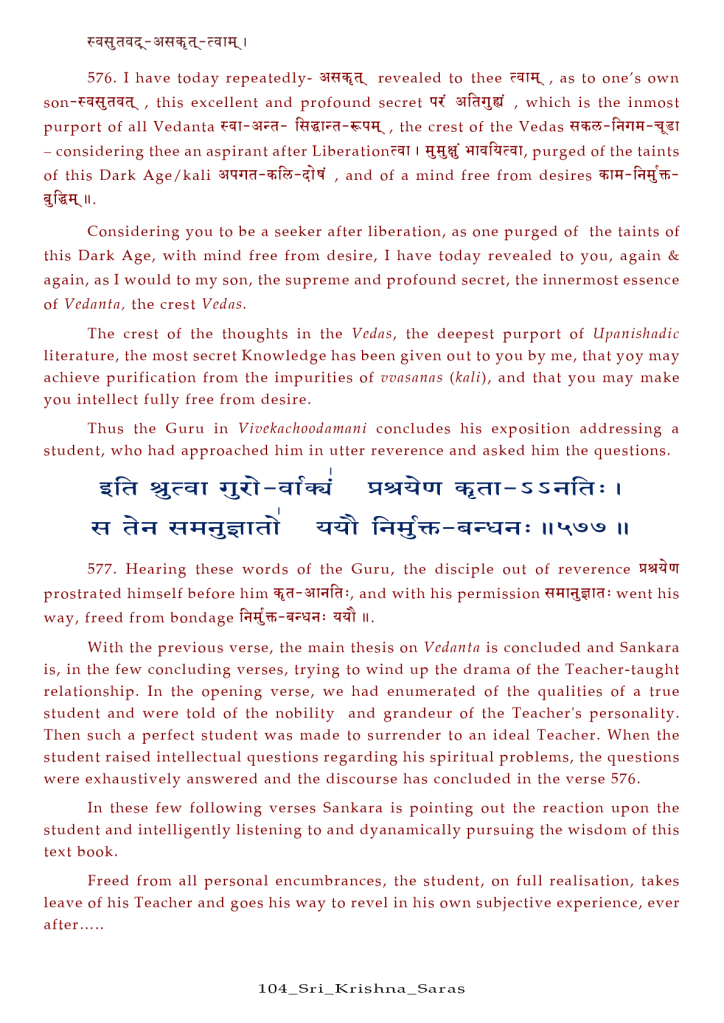
![TO the student who has thus realised, from his view, there is not difference
between himself and the Teacher, both are experiences Of the One-Infinite Self. Yet
the student prostrates at the feet Of the teacher "Out Of reverence". Inspite Of his
Realisation the student cannot overlook his sense Of utter gratitude to the Master
who has awakened him from the dark dreary misconception Of the ego and
inroduced him in the amphitheatre (A oval large stadium with tiers Of seats; an
arena in which contests and spectacles are held) Of the Self.
578. And the Guru, with his mind steeped in the ocean of Existence and Bliss
A b SOItIte
roamed verily purifying the whole
world — all differentiating ideas banished from his :
And the Teacher, his mind immersed in the Ocean Of eternal Bliss
for ever, wandered about, indeed blessing the whole world.
When the disciple had gone, the Guru did not sit back with a sign of relief.
The Guru also, with his mind fully steeped in the Ocean of eternal Bliss, moved
blessing the whole world, ever ready to explain and guide seekers who might
approach him.
077. The glory of the text-book (579-581)
[Ill]
579. Thus by way of a dialogue between the Teacher and the disciple, has the
nature of the Atman been ascertained for the easy comprehension of
seekers after Liberation.
Here in this verse, we have gankara's own declaration Of the motive with which
the poet-philosopher had industriously laboured through 578 verses so far. The
verse also indicates that Safikara has no philosophy of his own. It is only in recent
times we find that every philosopher has his own philosophy.
In Vivekachoodamani all that we have is a logical thought development Of the
entire theory Of Vedanta given out in a style and language, most fit for the easy
comprehension Of even the dull-witted). With this aim in view Safikra has woven
this poetic tapestry (A heavy textile with a woven design; used for curtains and
upholstery), most succesfully indeed.
105 _ Sr i _ Kr i s r a s](https://srikrishnasaras.home.blog/wp-content/uploads/2020/12/image-503.png?w=724)
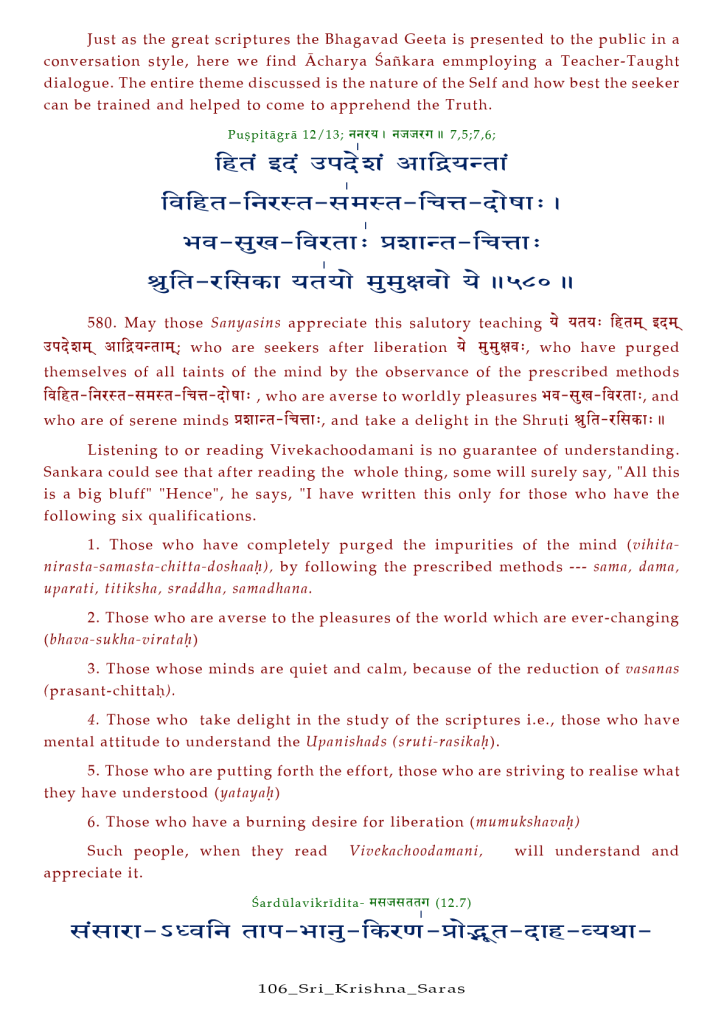
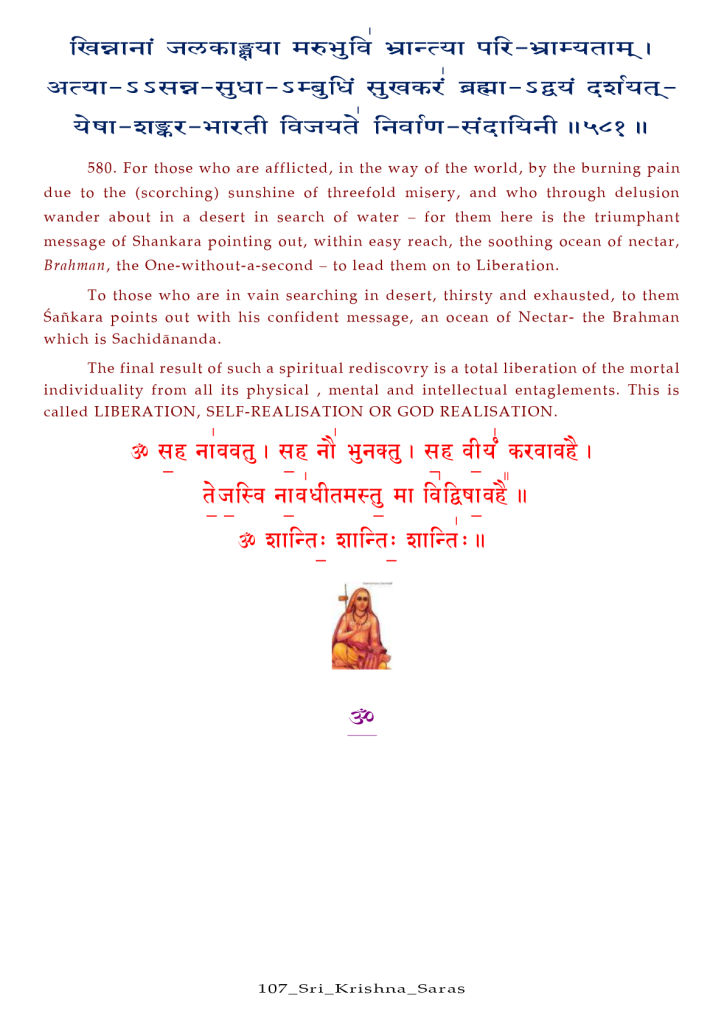
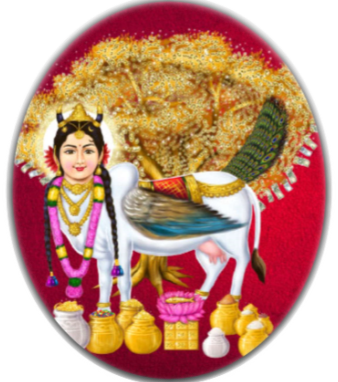























!["When one has realised one's Self to be nothing other than this great Purusha,
this infinite then desiring what, (or for the fulfilment Of which desire),
should he thereafter nurse, nourish and fatten his physical body?"
069. The Science of Reality-- Its Benefits. (419-425) -
CEIL]
11
419. The Yogi who has attained perfection and is liberated-in-life gets this as
a result — he enjoys eternal Bliss in his mind, internally as well as externally.
One who is fufilled in life, one who has cut asunder the shackles Of his finite
existence as the ego, one who is not bound by the chains Of his physical passions, or
mental pangs or intellectual agitations, what will he gain by such an experience?
Sankara insists that such an individual then, constantly experiences the bliss
which is the nature Of the Self, within and without. All exertions in life are only to
discover happiness. Once the highest happiness is gained, other lesser objects Of
happiness are Of no concern.
Thus through meditation, when an individual rises above the realm Of
disturbances and agitations and enters the realm Of sweet Bliss, which manifests
because Of its essential nature; he cannot then precipi tate into any activity we
ordinarily engage in our day to day existence.
11
420. The fruit of dispassion is Knowledge, that of Knowledge is
withdrawal from sense pleasure. The fruits of this withdrawal is the experience of
the Blissful Self and peace is this result of this experience.
The results that will accrue to the personality as an individual starts his
sadhnna are enumerated in a logical sequence.
relating to something preceeding;
421. If there is an absence of the succeeding stages, the preceding ones are
futile. (When the series is perfect) the cessation of the objective world,
extreme satisfaction, and matchless bliss follow as a matter Of course on its own.
24 _ S r i_Kr is a _ Sar a s](https://srikrishnasaras.home.blog/wp-content/uploads/2020/12/image-422.png?w=724)
















































































![TO the student who has thus realised, from his view, there is not difference
between himself and the Teacher, both are experiences Of the One-Infinite Self. Yet
the student prostrates at the feet Of the teacher "Out Of reverence". Inspite Of his
Realisation the student cannot overlook his sense Of utter gratitude to the Master
who has awakened him from the dark dreary misconception Of the ego and
inroduced him in the amphitheatre (A oval large stadium with tiers Of seats; an
arena in which contests and spectacles are held) Of the Self.
578. And the Guru, with his mind steeped in the ocean of Existence and Bliss
A b SOItIte
roamed verily purifying the whole
world — all differentiating ideas banished from his :
And the Teacher, his mind immersed in the Ocean Of eternal Bliss
for ever, wandered about, indeed blessing the whole world.
When the disciple had gone, the Guru did not sit back with a sign of relief.
The Guru also, with his mind fully steeped in the Ocean of eternal Bliss, moved
blessing the whole world, ever ready to explain and guide seekers who might
approach him.
077. The glory of the text-book (579-581)
[Ill]
579. Thus by way of a dialogue between the Teacher and the disciple, has the
nature of the Atman been ascertained for the easy comprehension of
seekers after Liberation.
Here in this verse, we have gankara's own declaration Of the motive with which
the poet-philosopher had industriously laboured through 578 verses so far. The
verse also indicates that Safikara has no philosophy of his own. It is only in recent
times we find that every philosopher has his own philosophy.
In Vivekachoodamani all that we have is a logical thought development Of the
entire theory Of Vedanta given out in a style and language, most fit for the easy
comprehension Of even the dull-witted). With this aim in view Safikra has woven
this poetic tapestry (A heavy textile with a woven design; used for curtains and
upholstery), most succesfully indeed.
105 _ Sr i _ Kr i s r a s](https://srikrishnasaras.home.blog/wp-content/uploads/2020/12/image-503.png?w=724)

